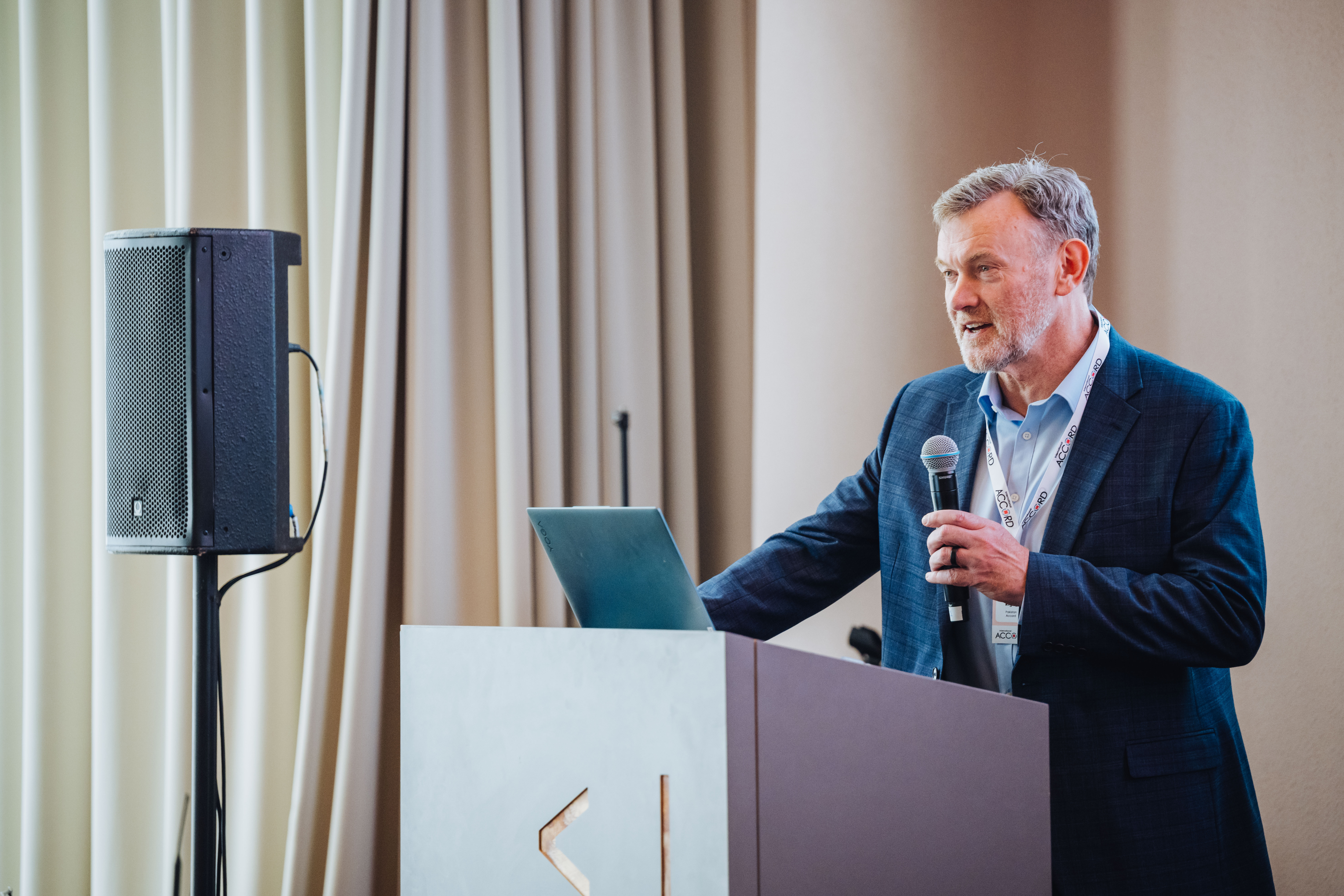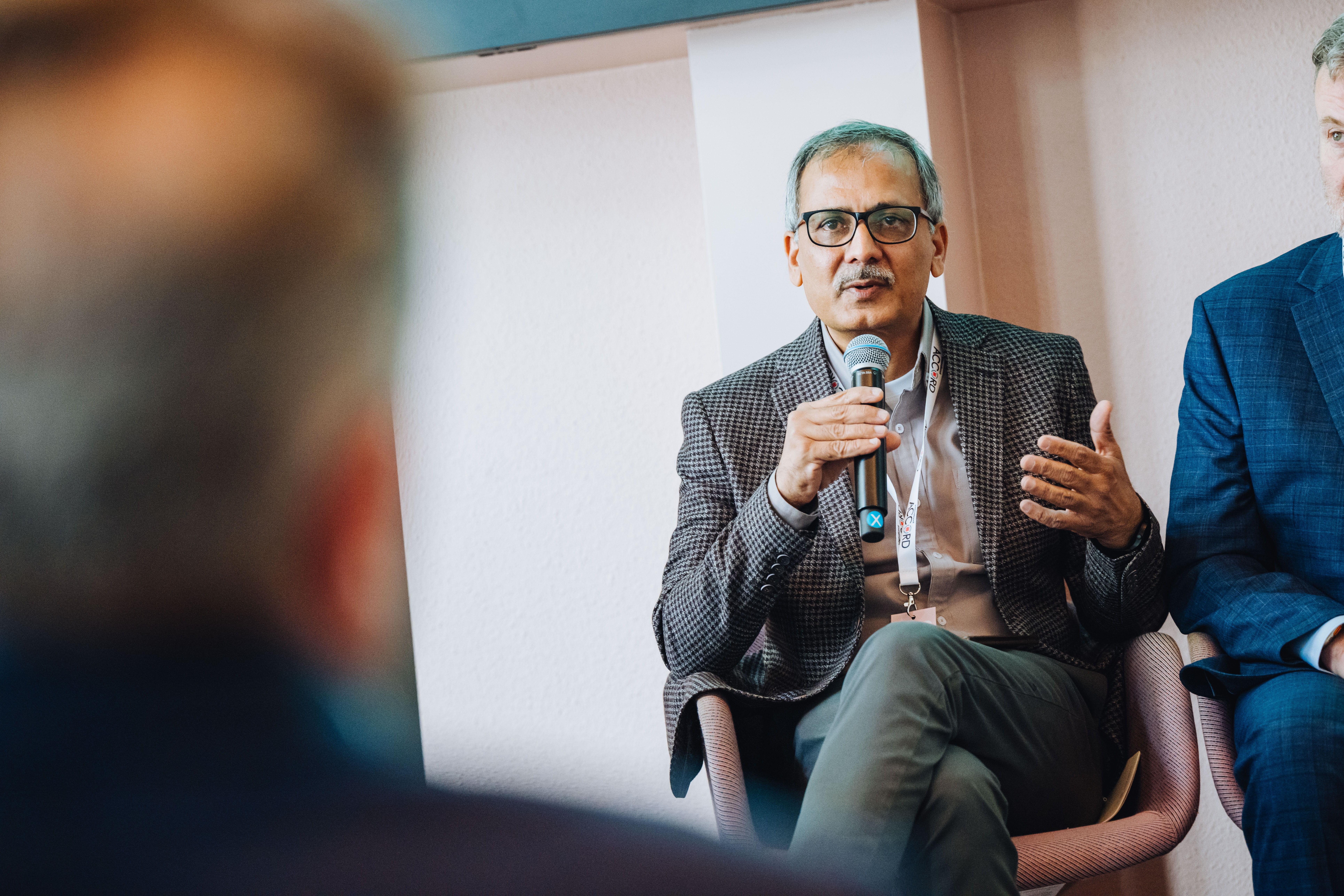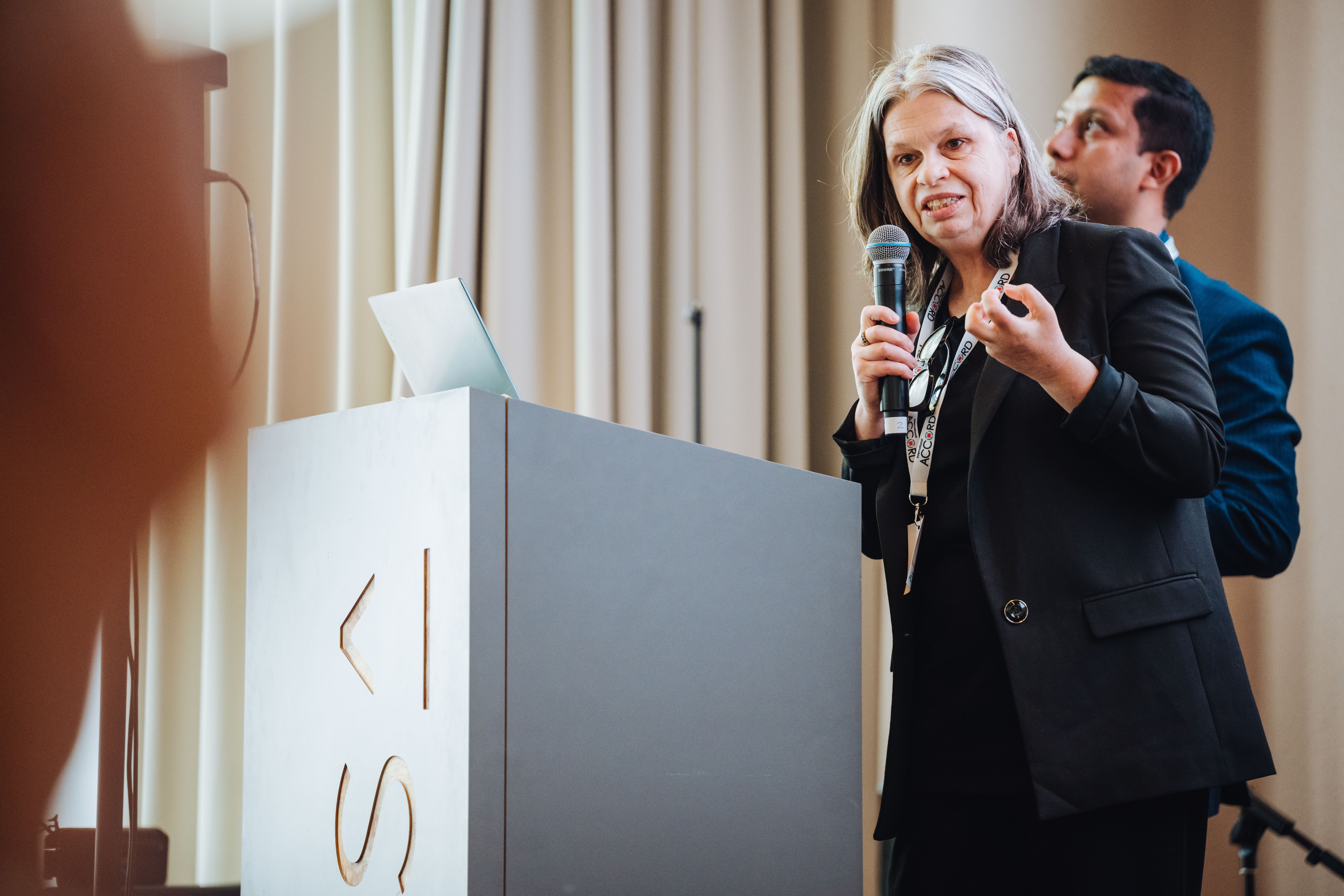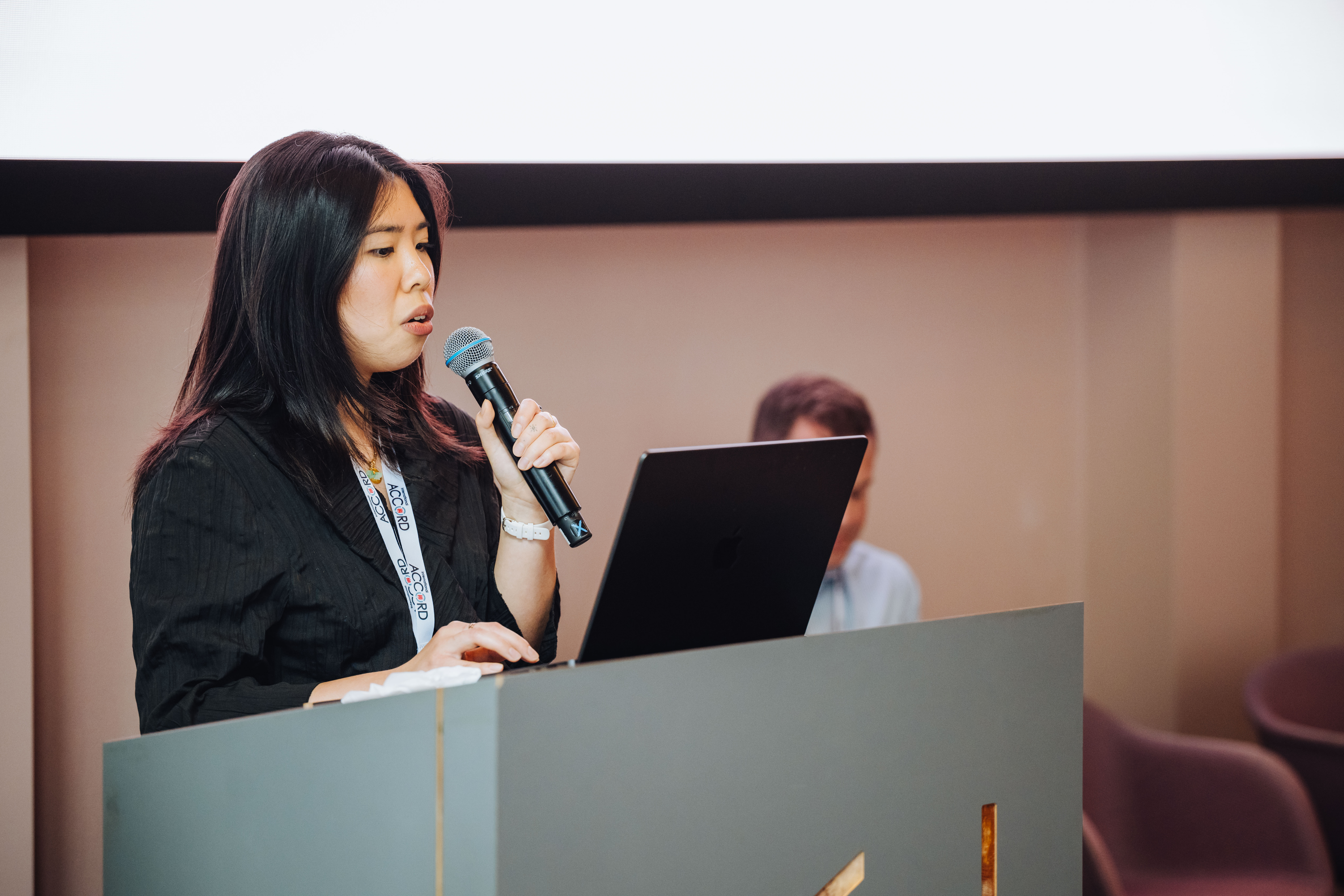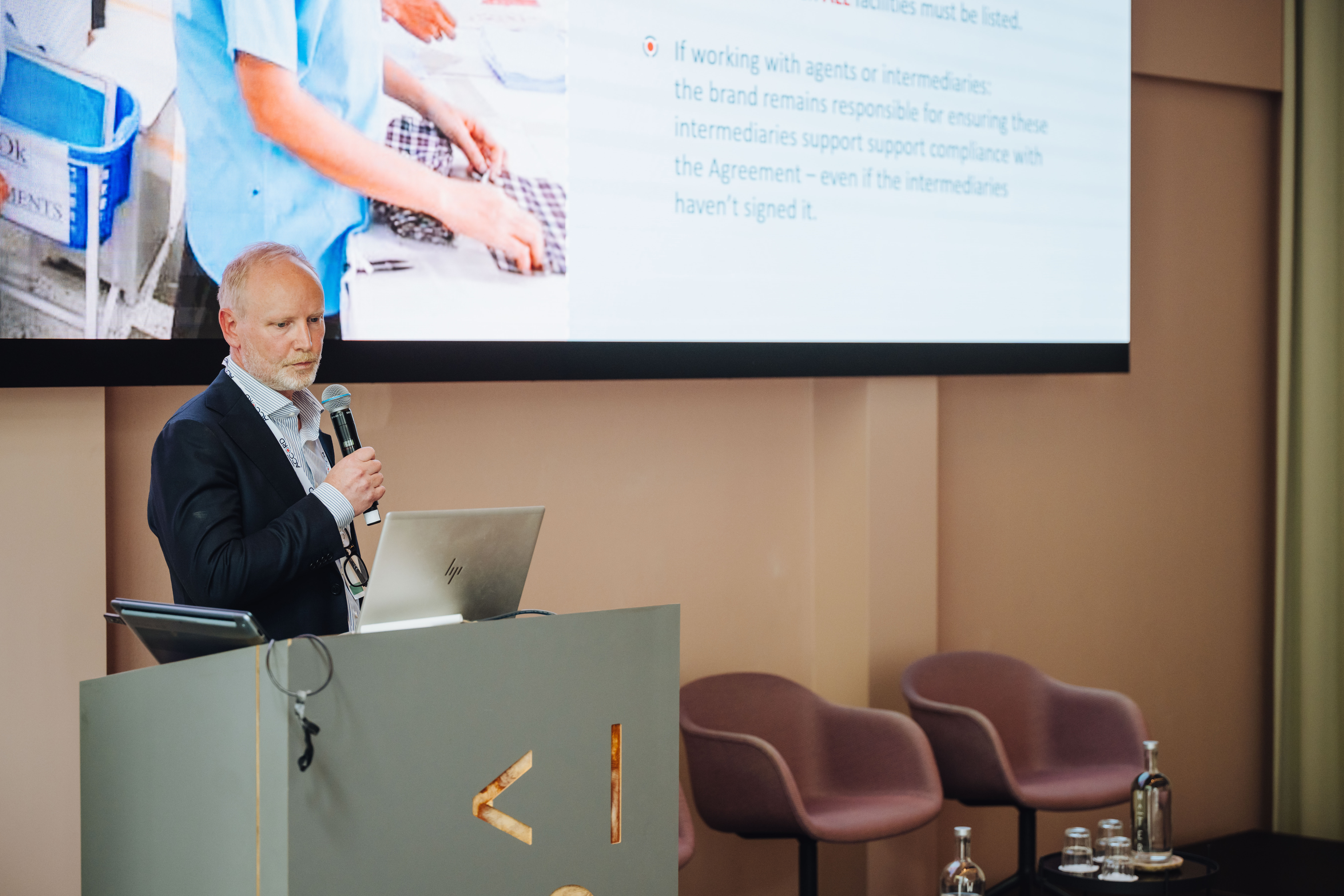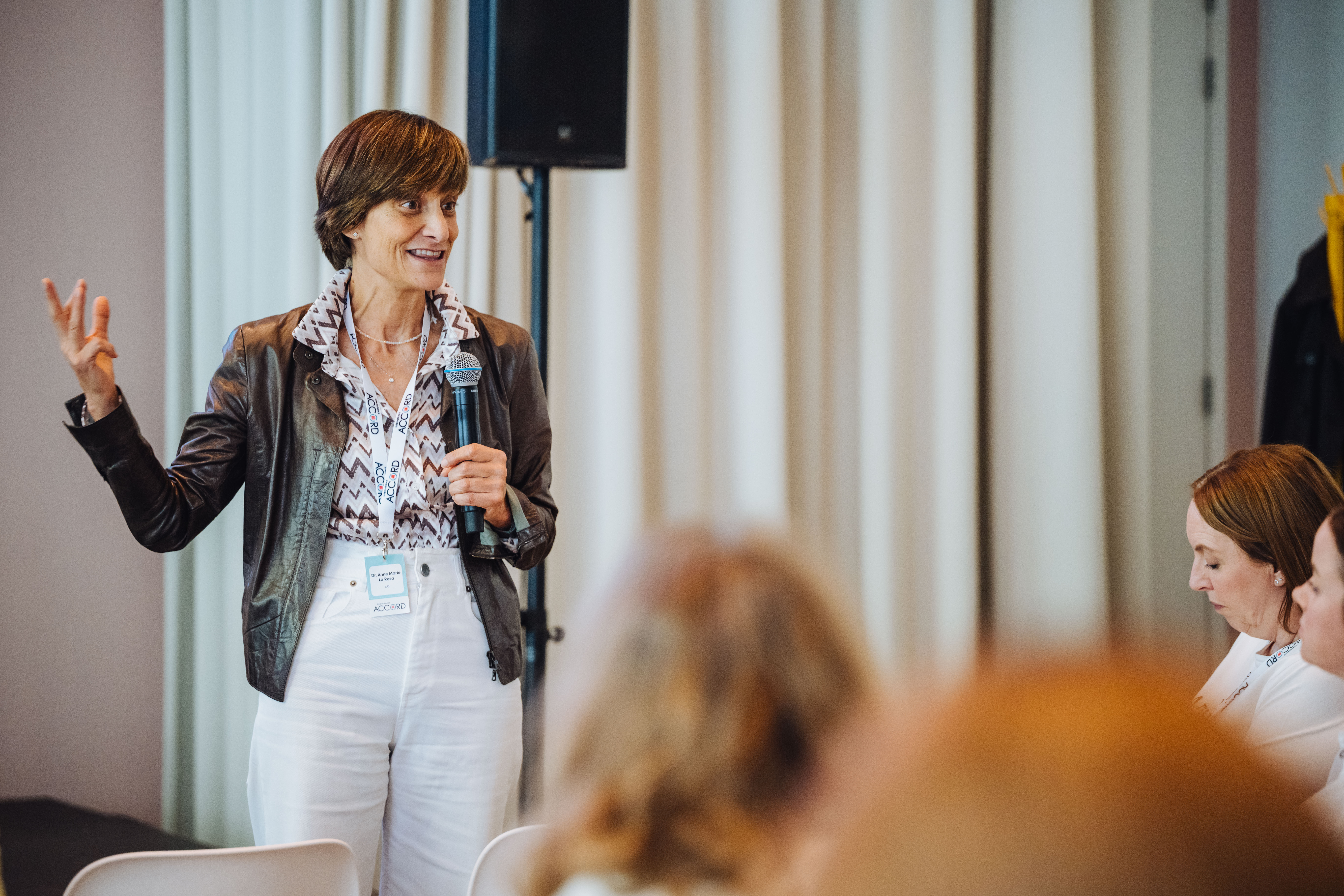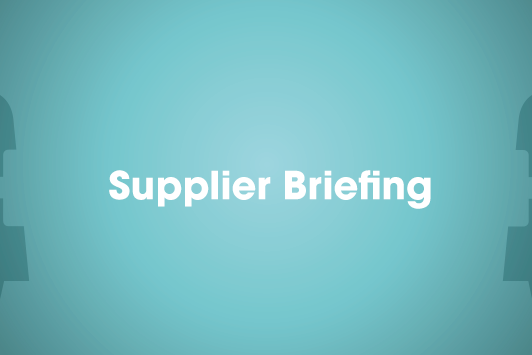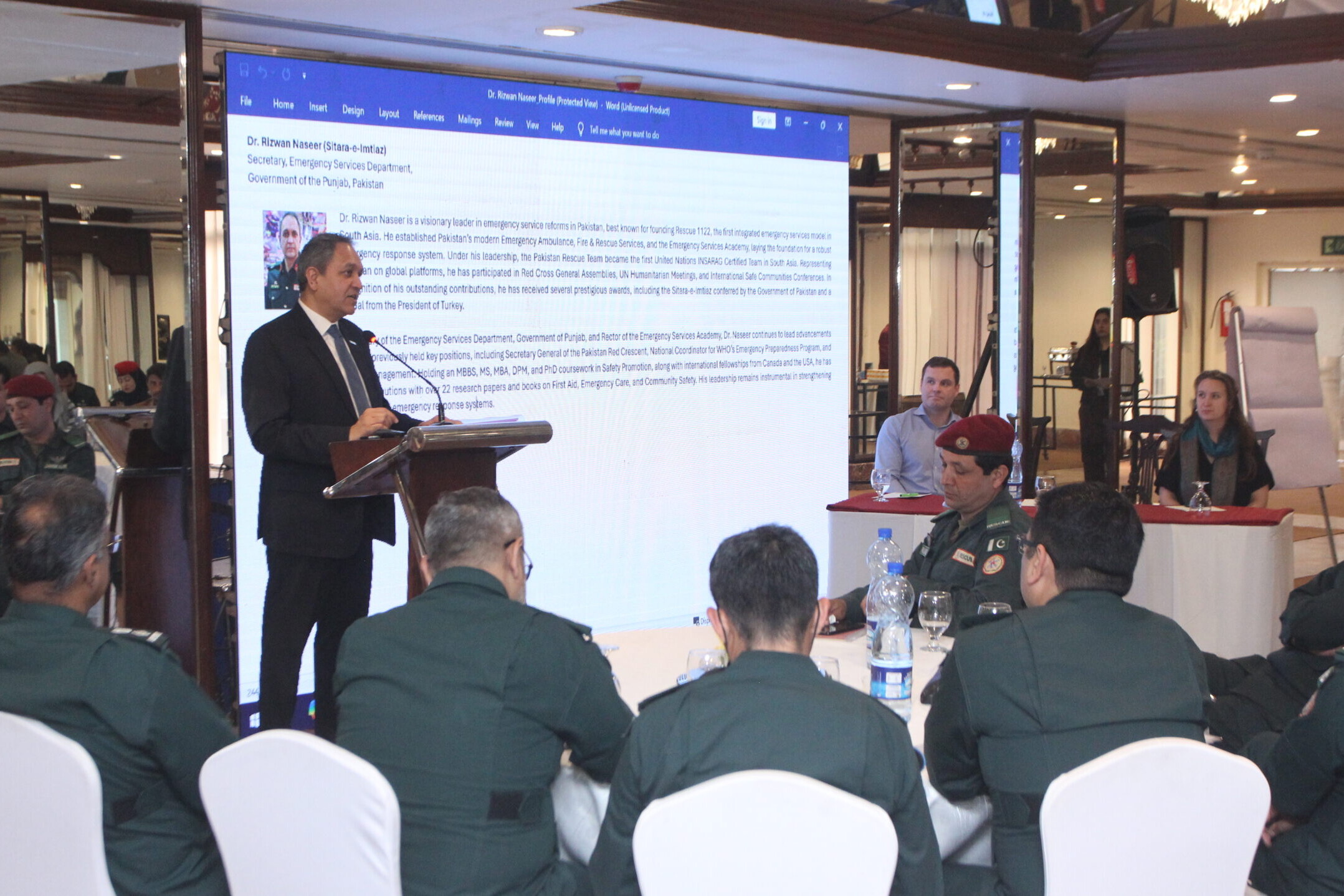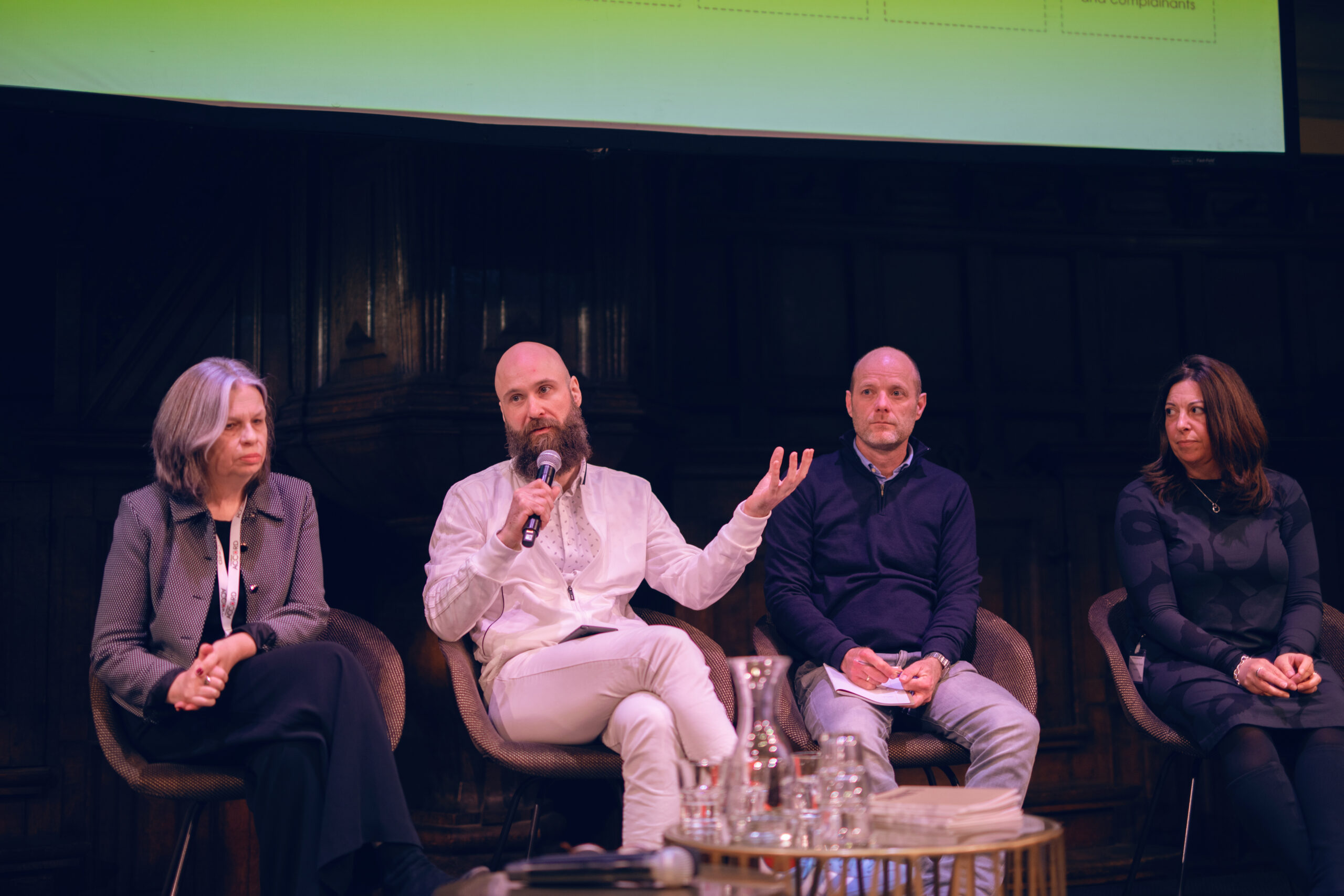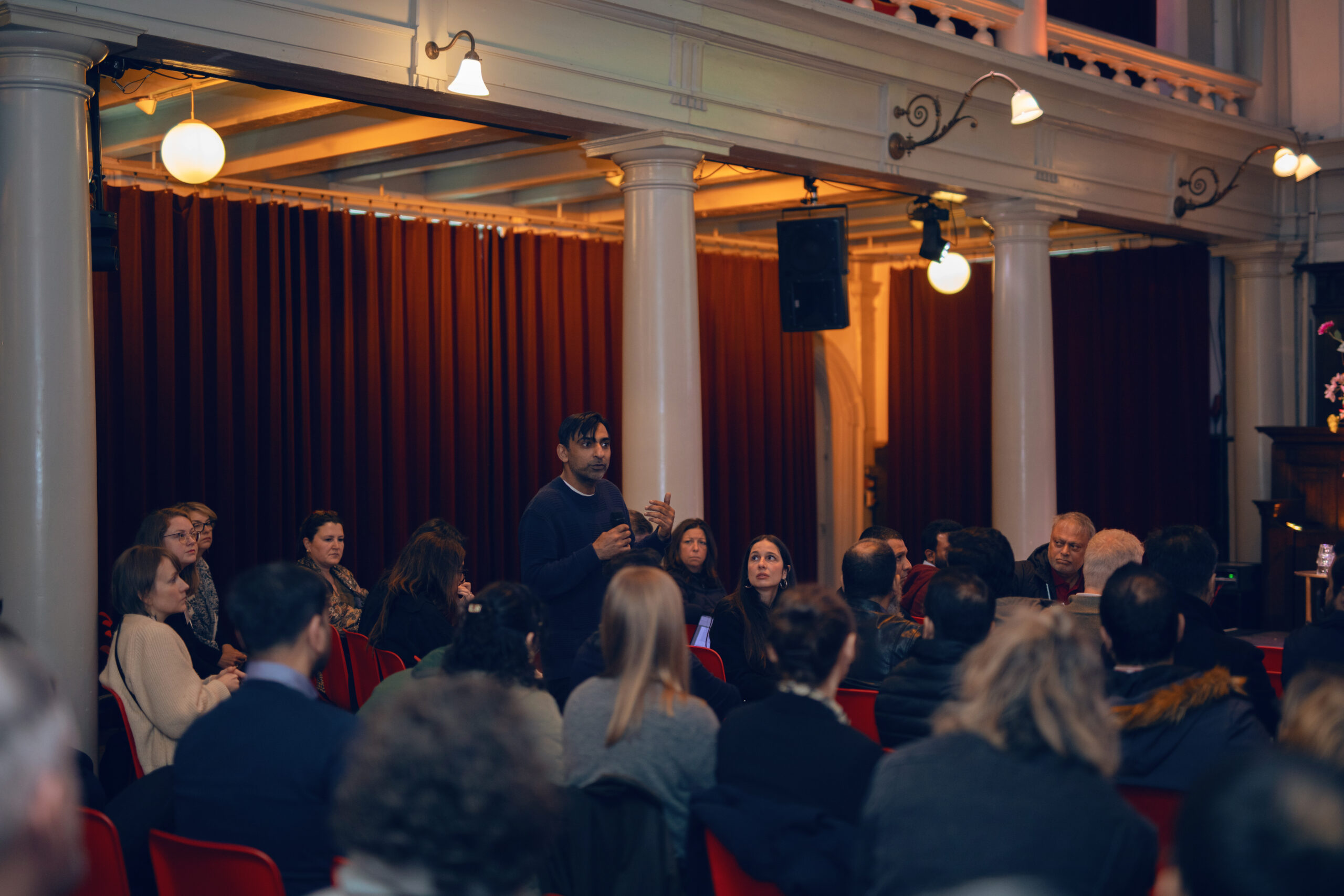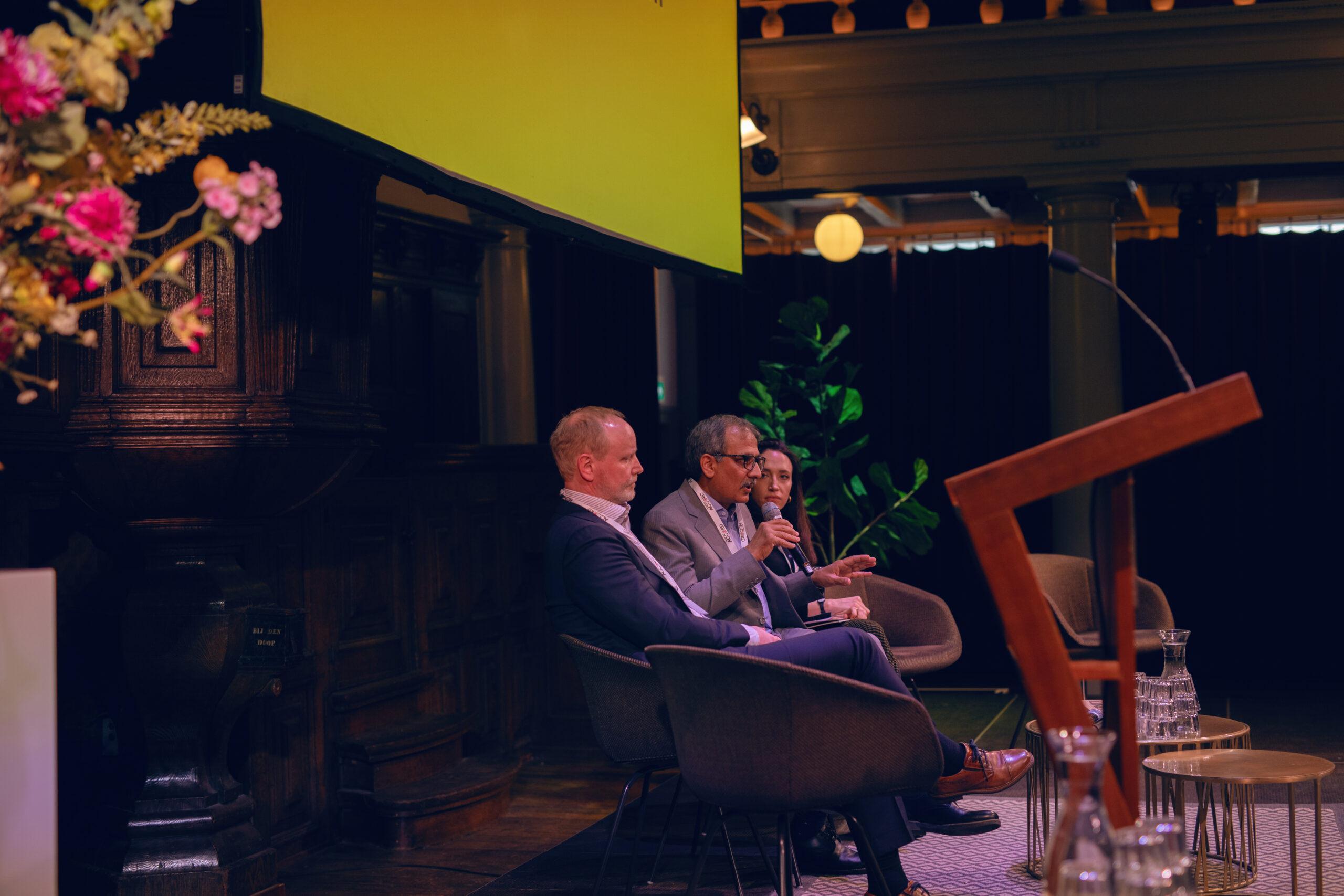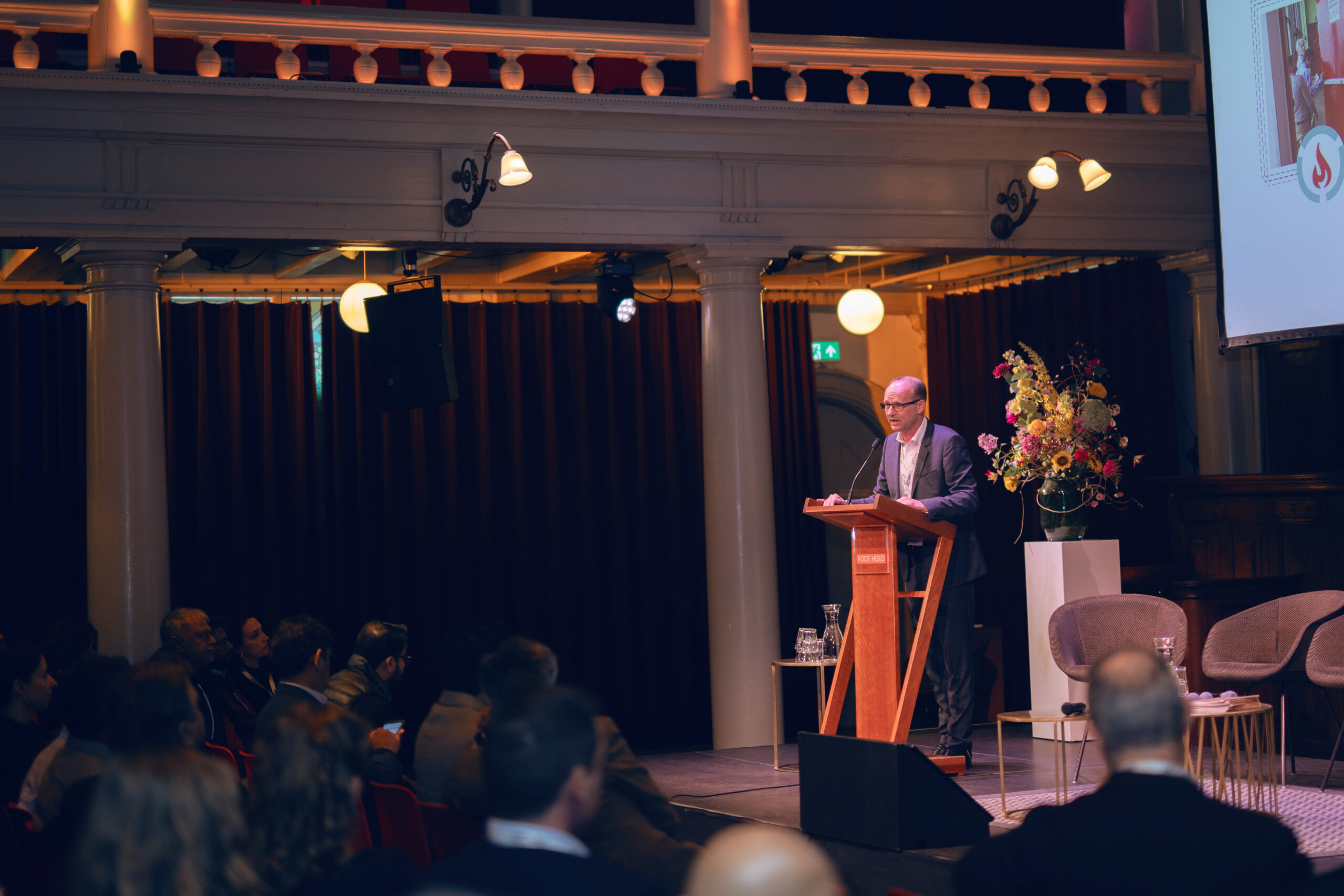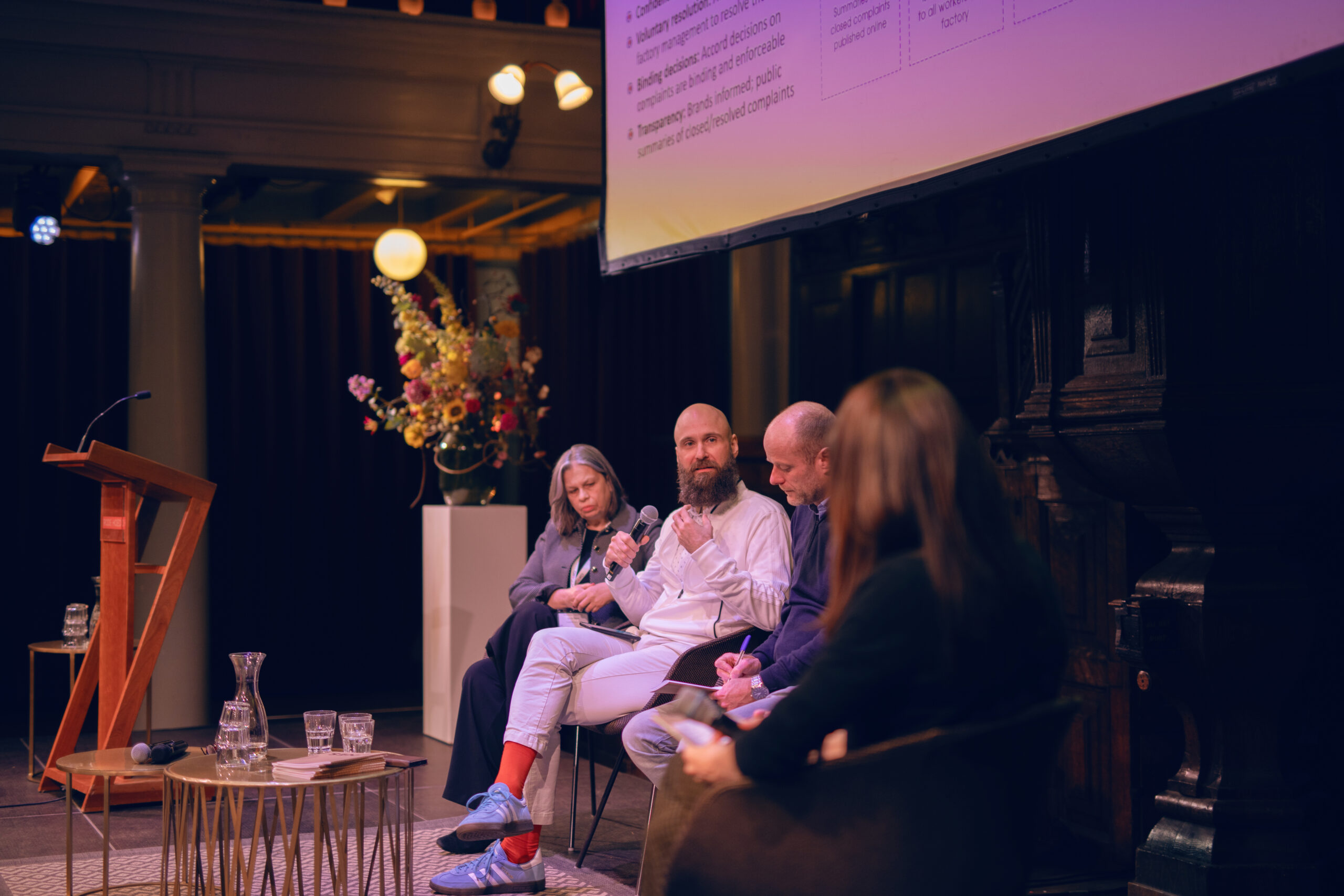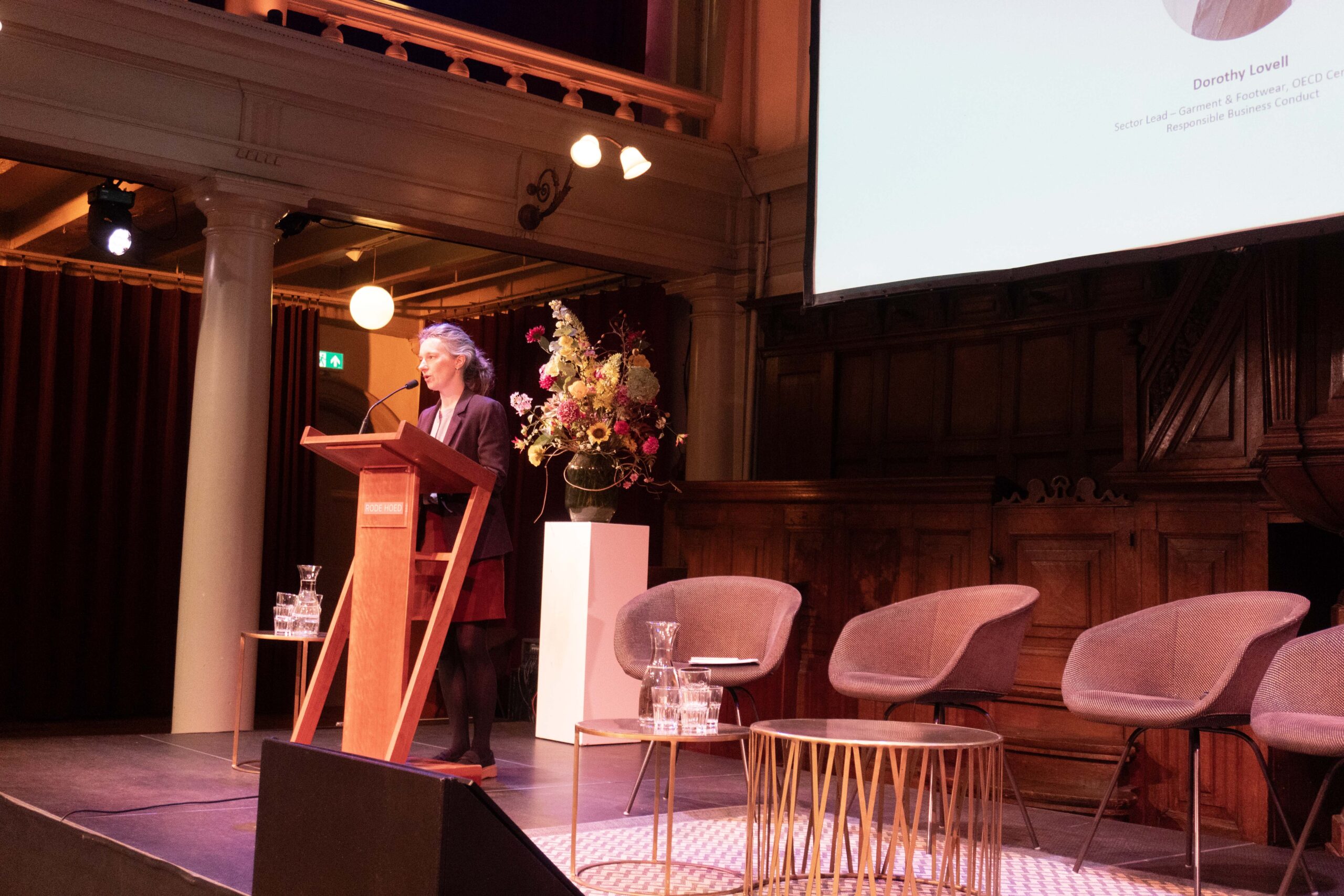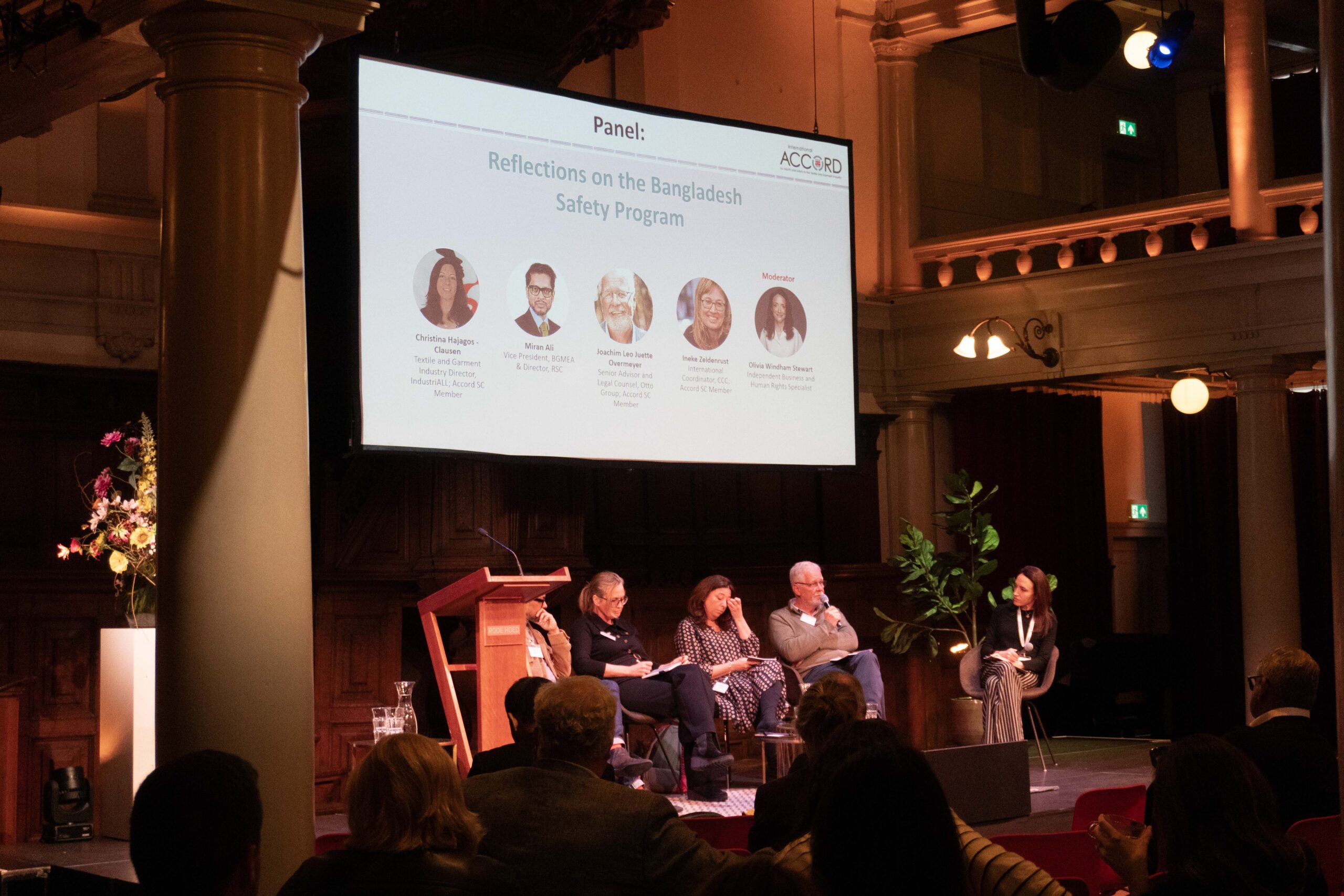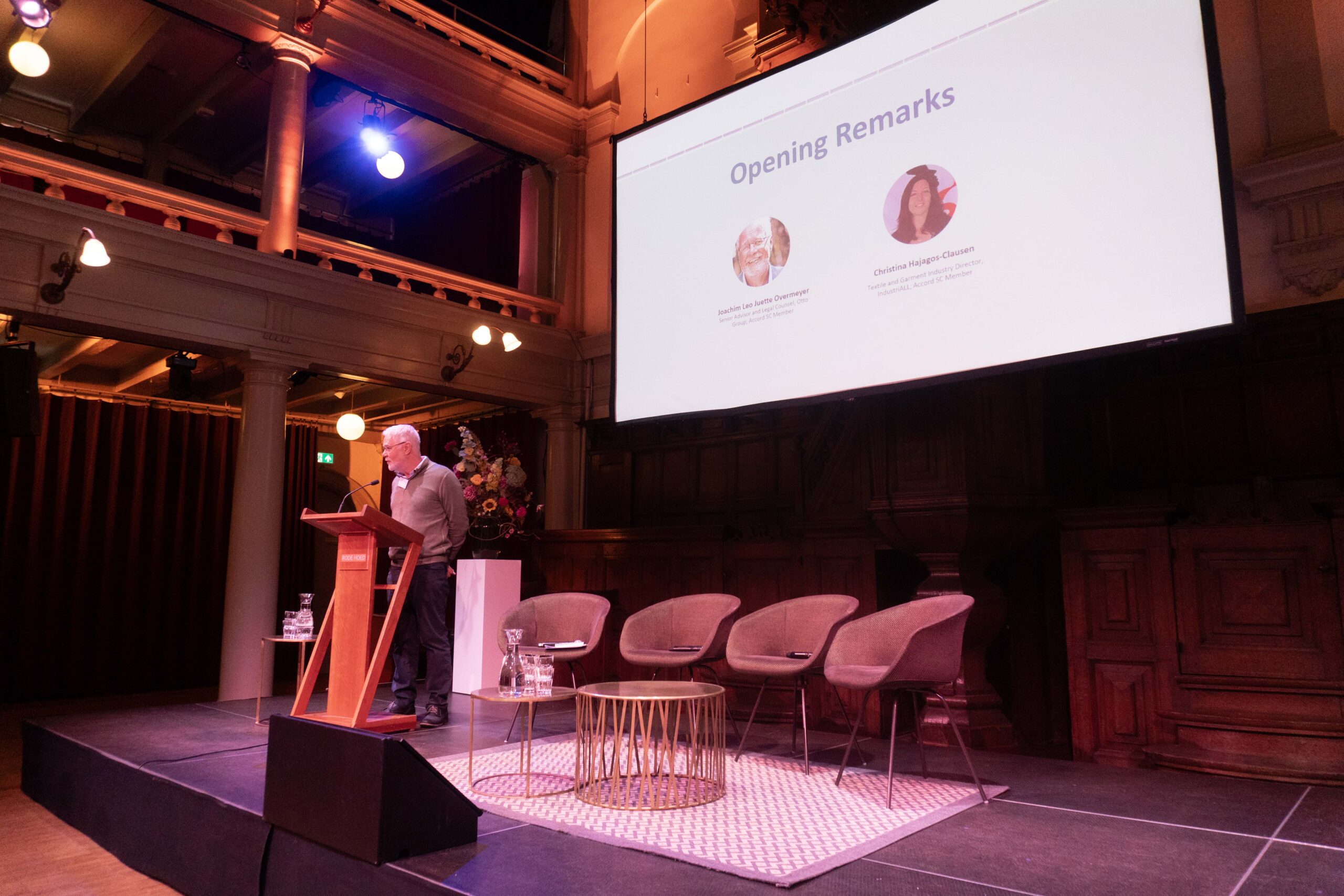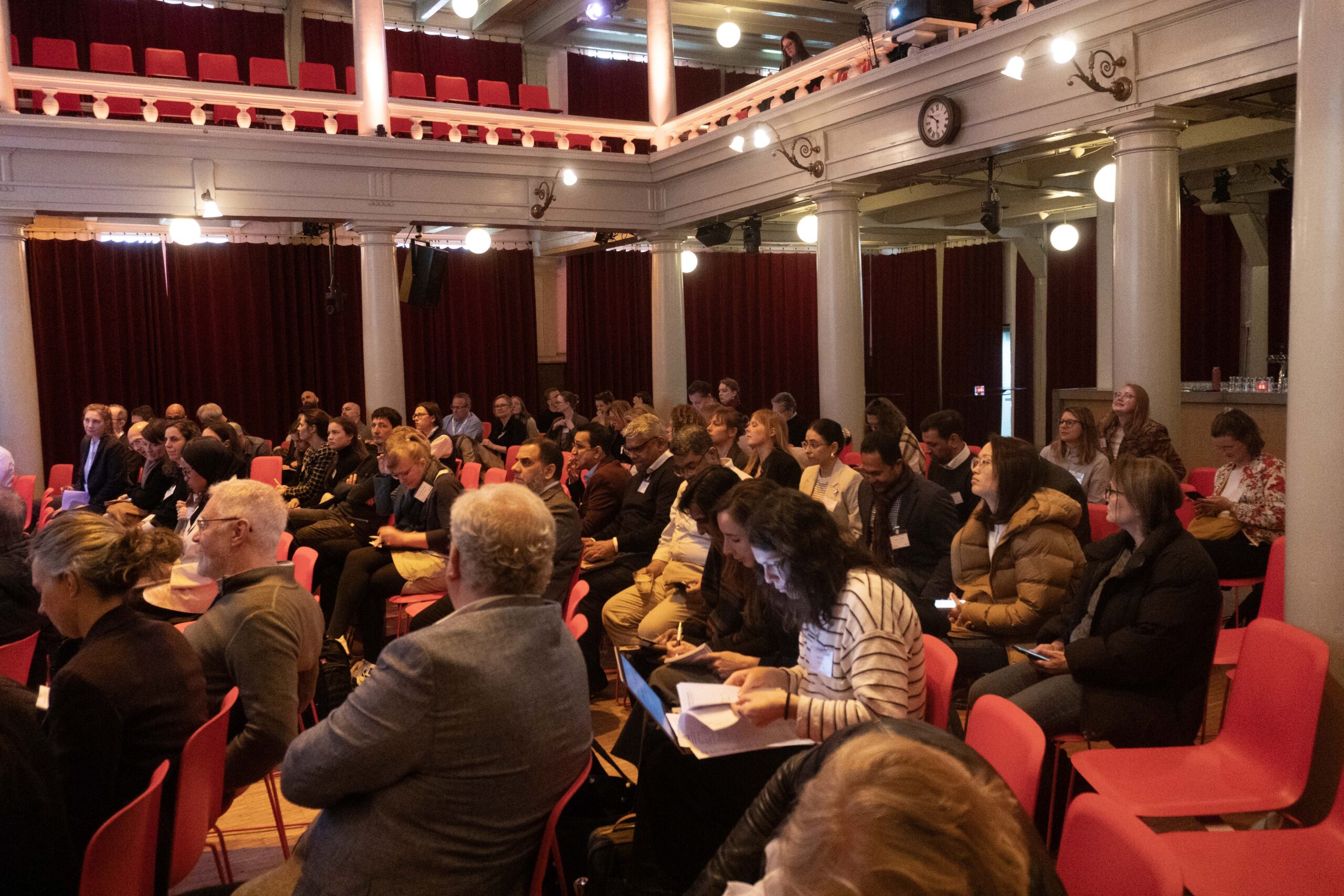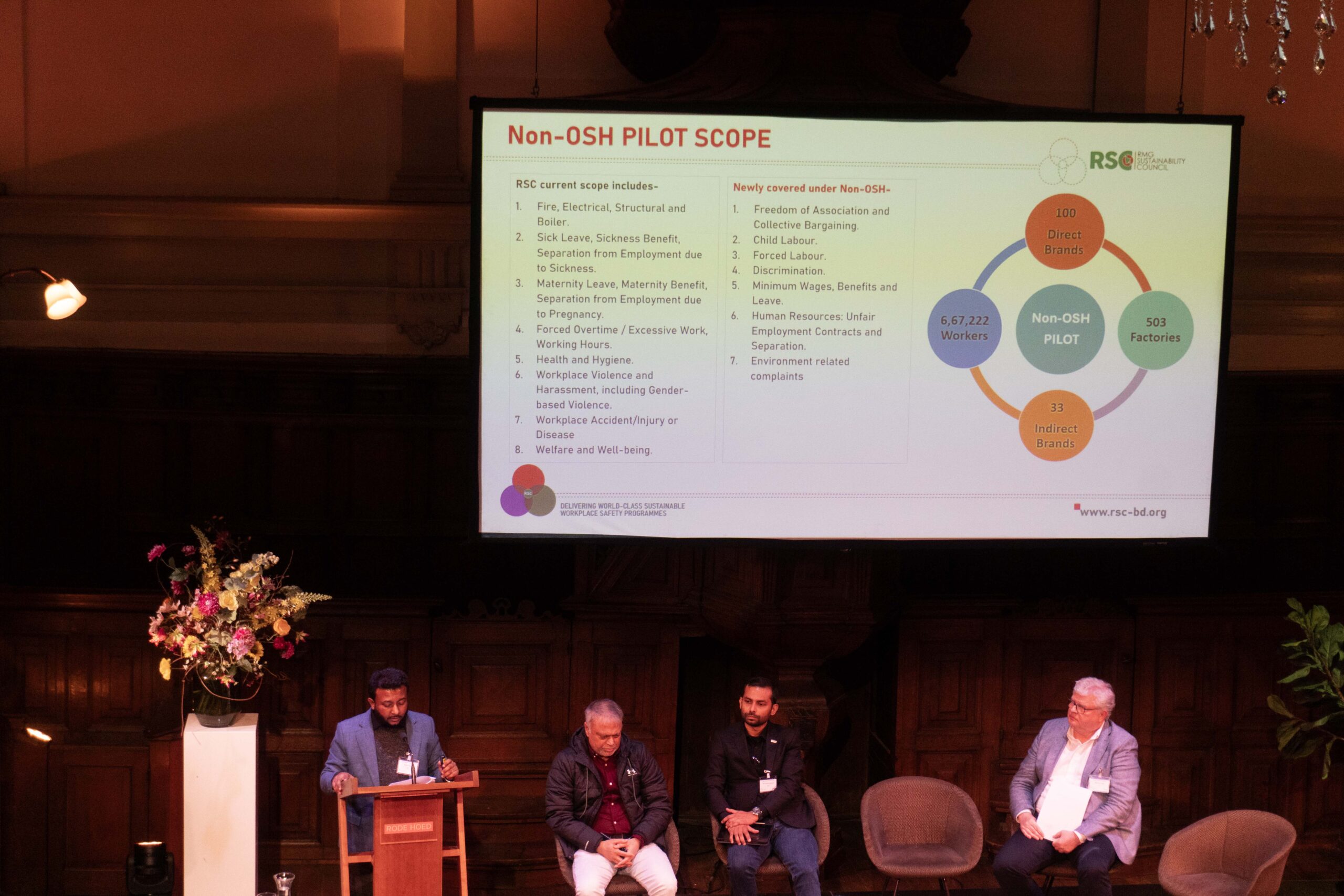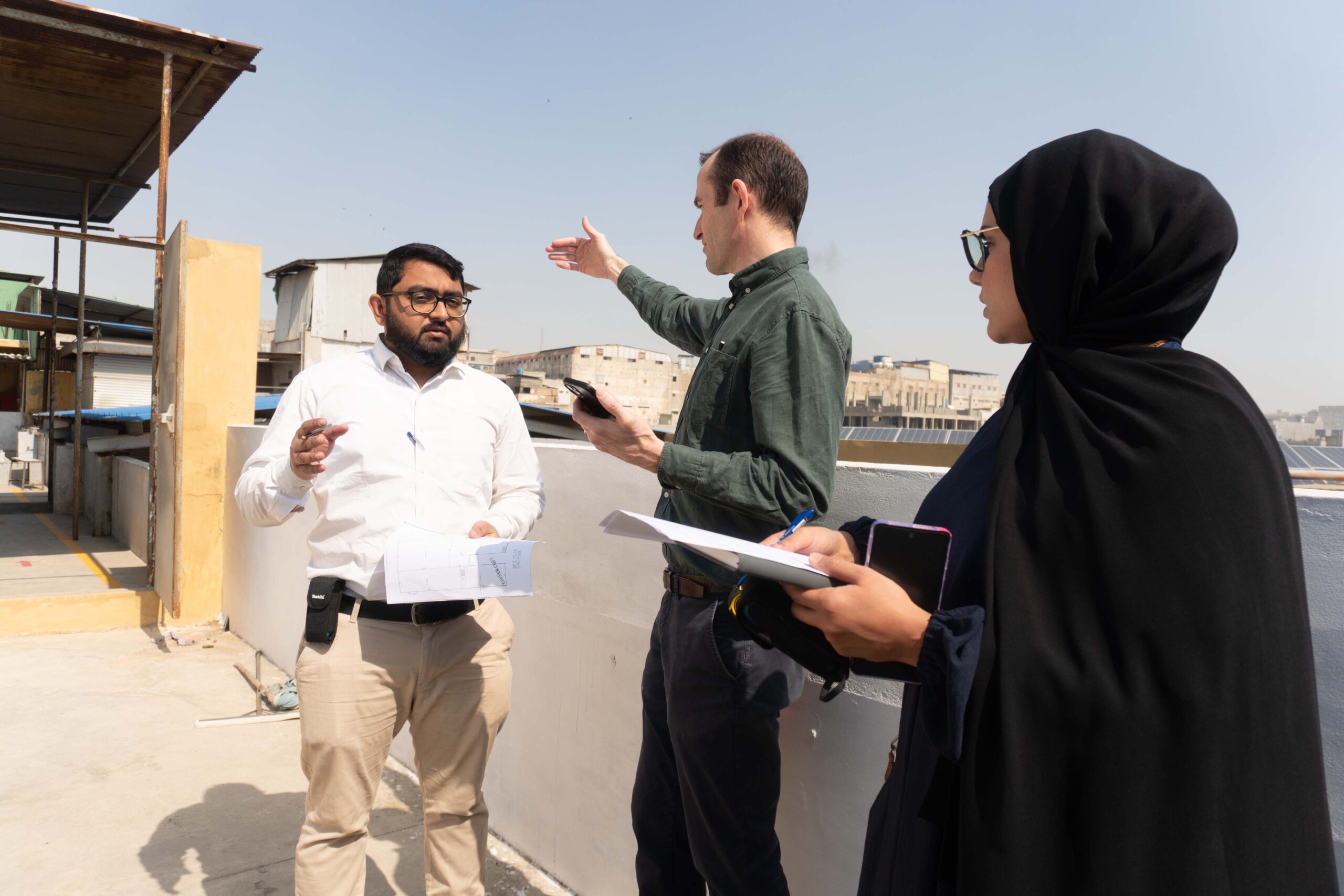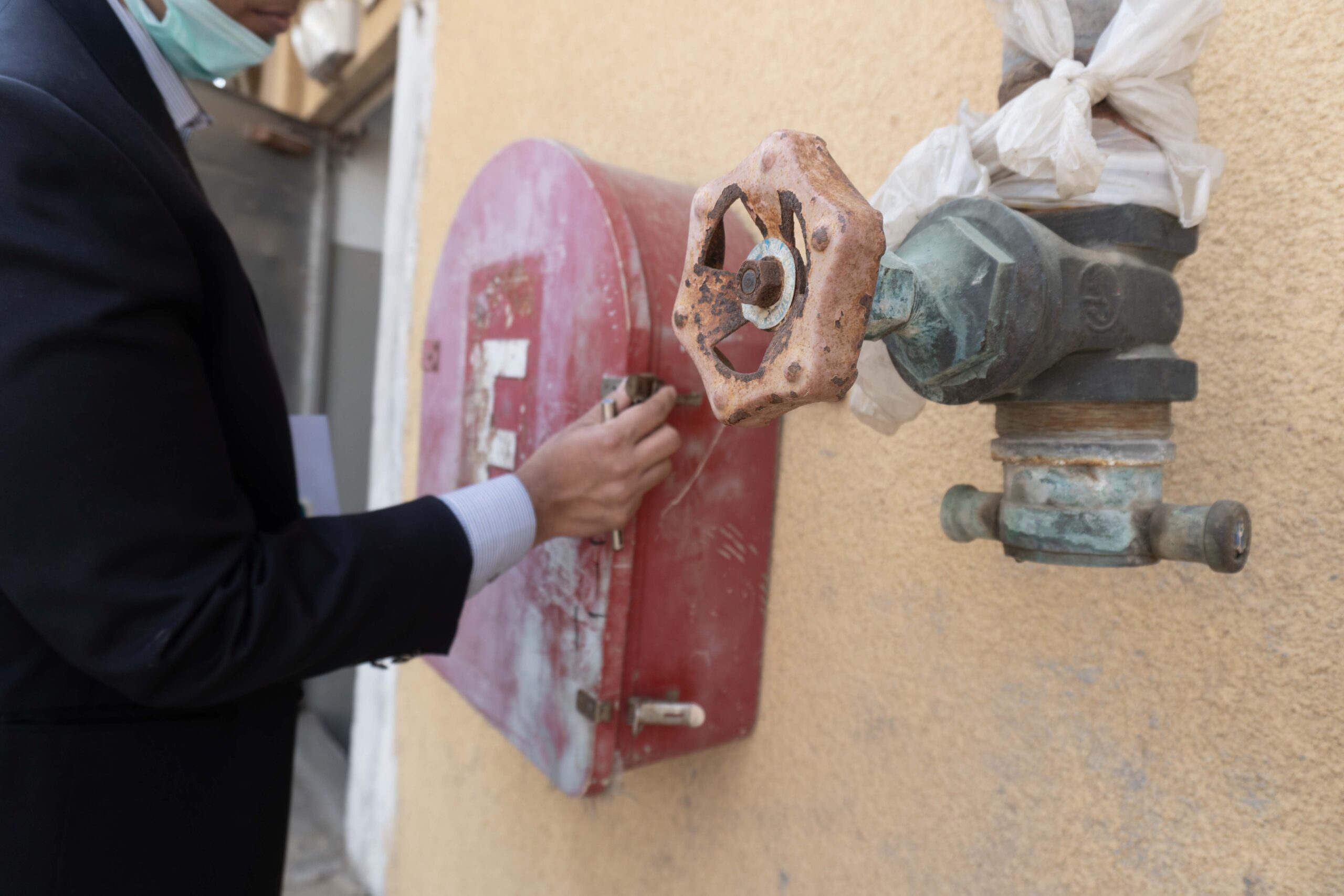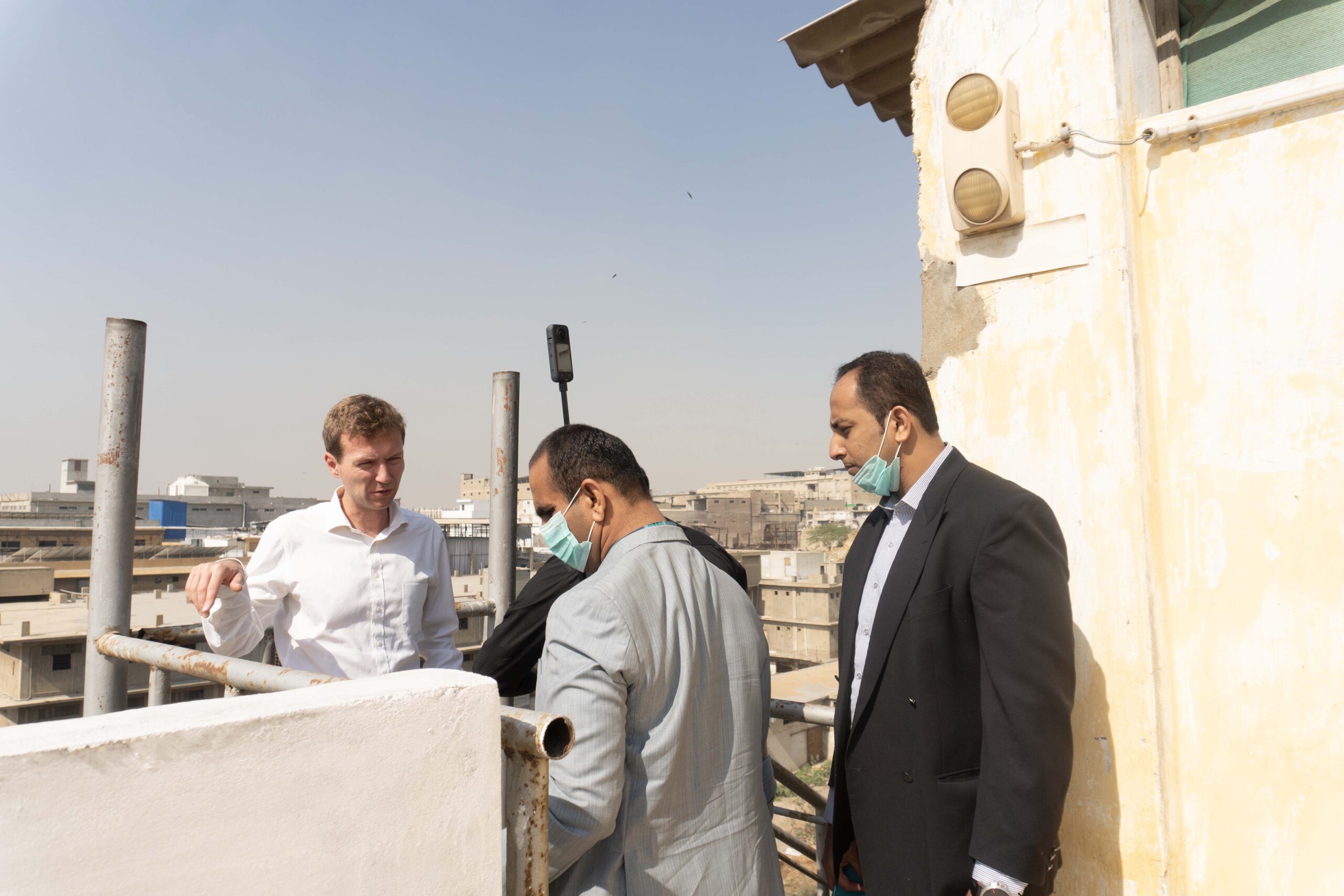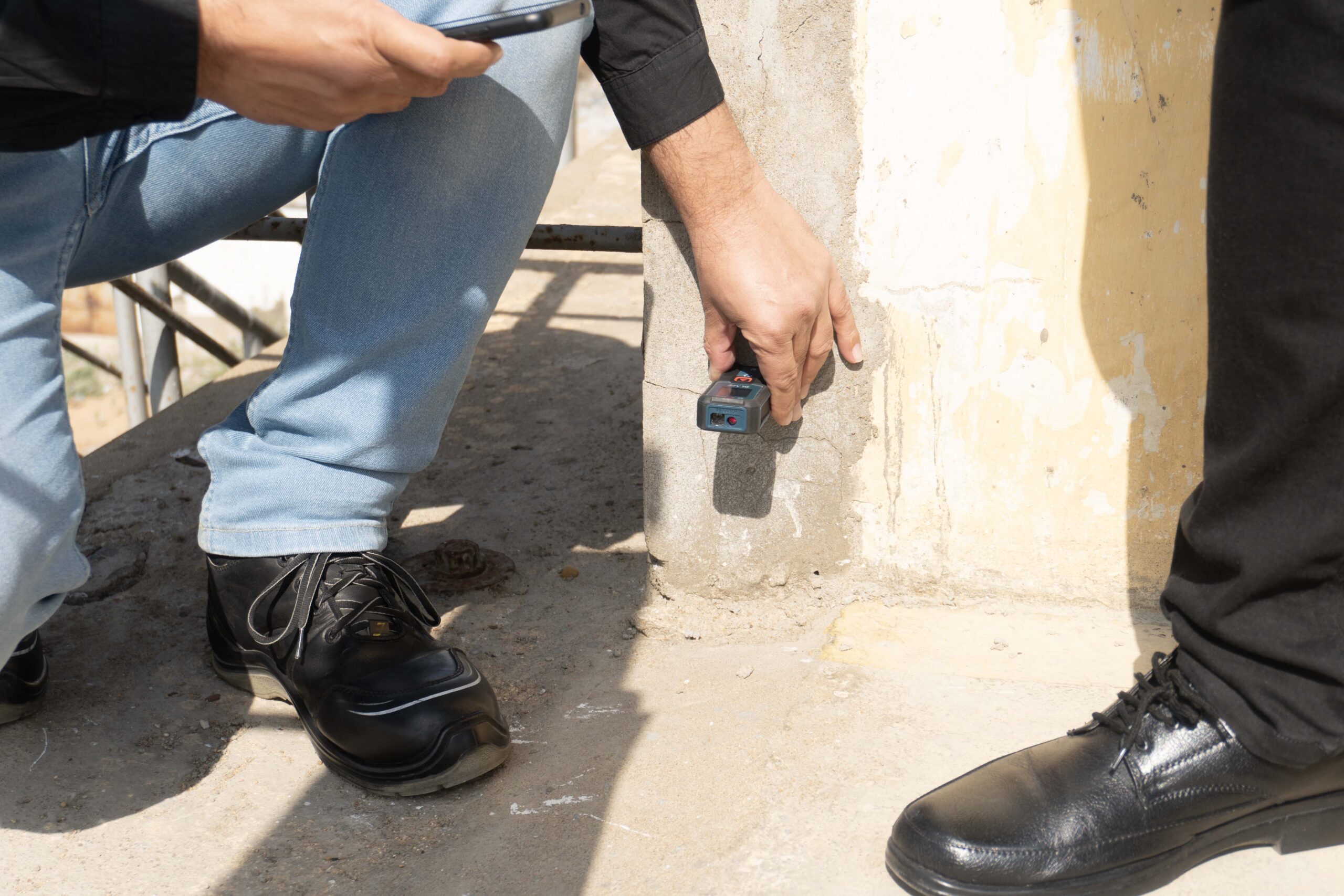Recap: Accord All Signatory Meeting 2025
Updates
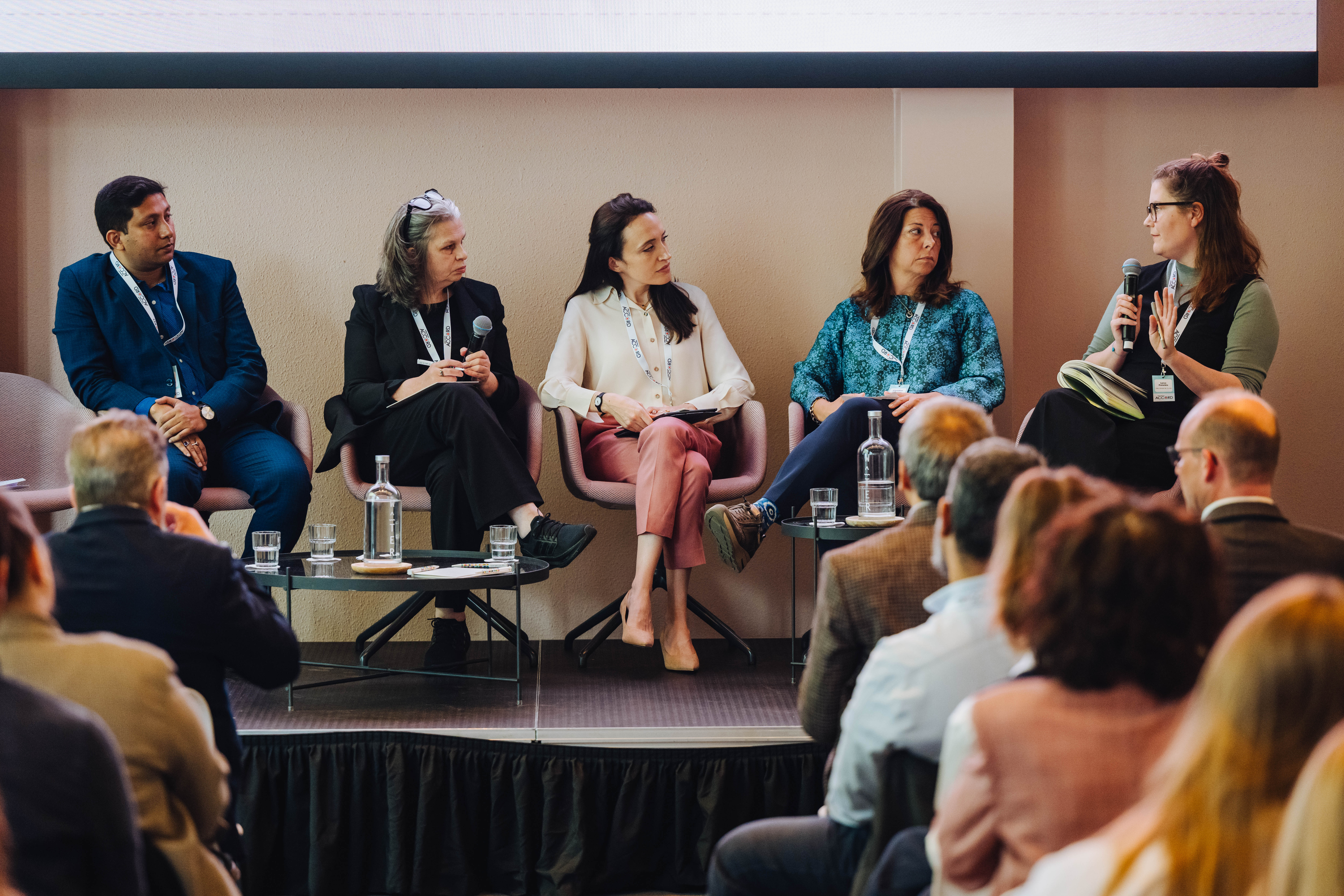
The International Accord held its 2025 All Signatory Meeting on 21 May at Hotel Casa in Amsterdam, the Netherlands. The meeting offered valuable insights into the progress and operations of the Accord’s Country-Specific Safety Programs (CSSPs) in Bangladesh and Pakistan, while exploring future opportunities for expanding the Accord’s scope and impact.
The event brought together over 120 participants from key stakeholder groups, including brand, trade union, and NGO signatories. It also welcomed colleagues from the RMG Sustainability Council (RSC) and the Pakistan Accord Secretariat.
The day commenced with opening remarks from Joris Oldenziel, Executive Director of the International Accord. He welcomed attendees and reflected on the broader socio-political and legislative developments affecting the global textile and garment industry.
Oldenziel noted that, despite ongoing global challenges, the Accord continues to gain momentum. He highlighted that the International Accord and its Bangladesh country program have reached a historic milestone—achieving the highest number of signatories to date.

Updates on the Pakistan Accord
Zulfiqar Shah, Country Director of the Pakistan Accord, and Paul Rigby, Chief Safety Officer (CSO), shared insights on the Pakistan Accord’s implementation. They outlined the growing coverage of signatories, factories, and workers under the country program. Shah highlighted the encouraging reception from factories for the worker safety training sessions, as well as the positive feedback received on the government capacity-building program.
Rigby provided detailed updates on the factory remediation work underway in Pakistan, including the fire, electrical and structural safety issues at covered factories since the start of inspections in October 2023. He noted overstressed structural columns and a lack of access to safe egress for workers as common safety issues requiring remediation.
He further highlighted the ongoing knowledge exchange and collaboration between the engineers from the Pakistan and Bangladesh teams.
Rigby underscored the importance of engagement between brands, retailers and suppliers. He urged brands and retailers to be closely involved in the inspection and remediation process, stressing that proactive collaboration enables more effective risk identification, accelerates remediation timelines, and fosters stronger relationships with factories.
Updates on the Bangladesh Safety Agreement
Abdul Haque, Managing Director of RSC, along with Shah Sefat Uddin Ahmed, Senior Head of the Remediation Program, and MD Hassan Nawazis, Chief Safety Officer (CSO), shared updates and insights into the ongoing health and safety efforts under the Bangladesh Safety Agreement.
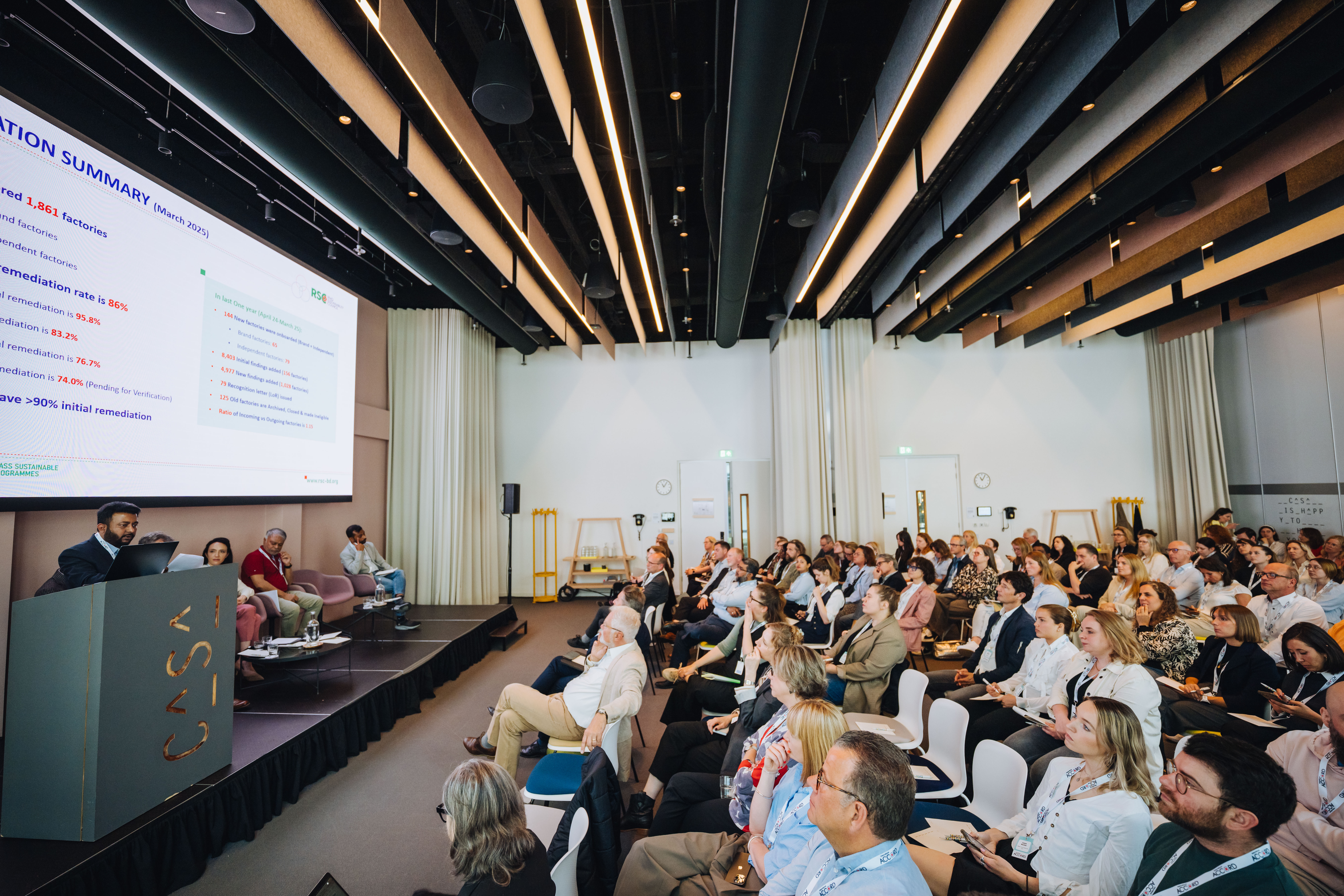
The team outlined several key measures aimed at strengthening remediation efforts at covered factories in Bangladesh. These include:
- Capacity-building workshops for factories and service providers
- Clear communication of remediation requirements following inspections
- Introduction of Stage 1 meetings to address non-compliances promptly
Updates included progress on inspection scopes at covered factories and the expansion of the Occupational Safety and Health (OSH) Complaints Mechanism, and the planned digitalisation to streamline organisational processes.
Perspectives on the Complaints Mechanism
Kirstine Drew, Chief Complaints Officer for the Pakistan Accord, and Ovijit Mutsuddi, Head of the Occupational Safety and Health (OSH) Complaints Mechanism Department at the RSC, presented comparative insights from Bangladesh and Pakistan on the Accord’s Complaints Mechanism.
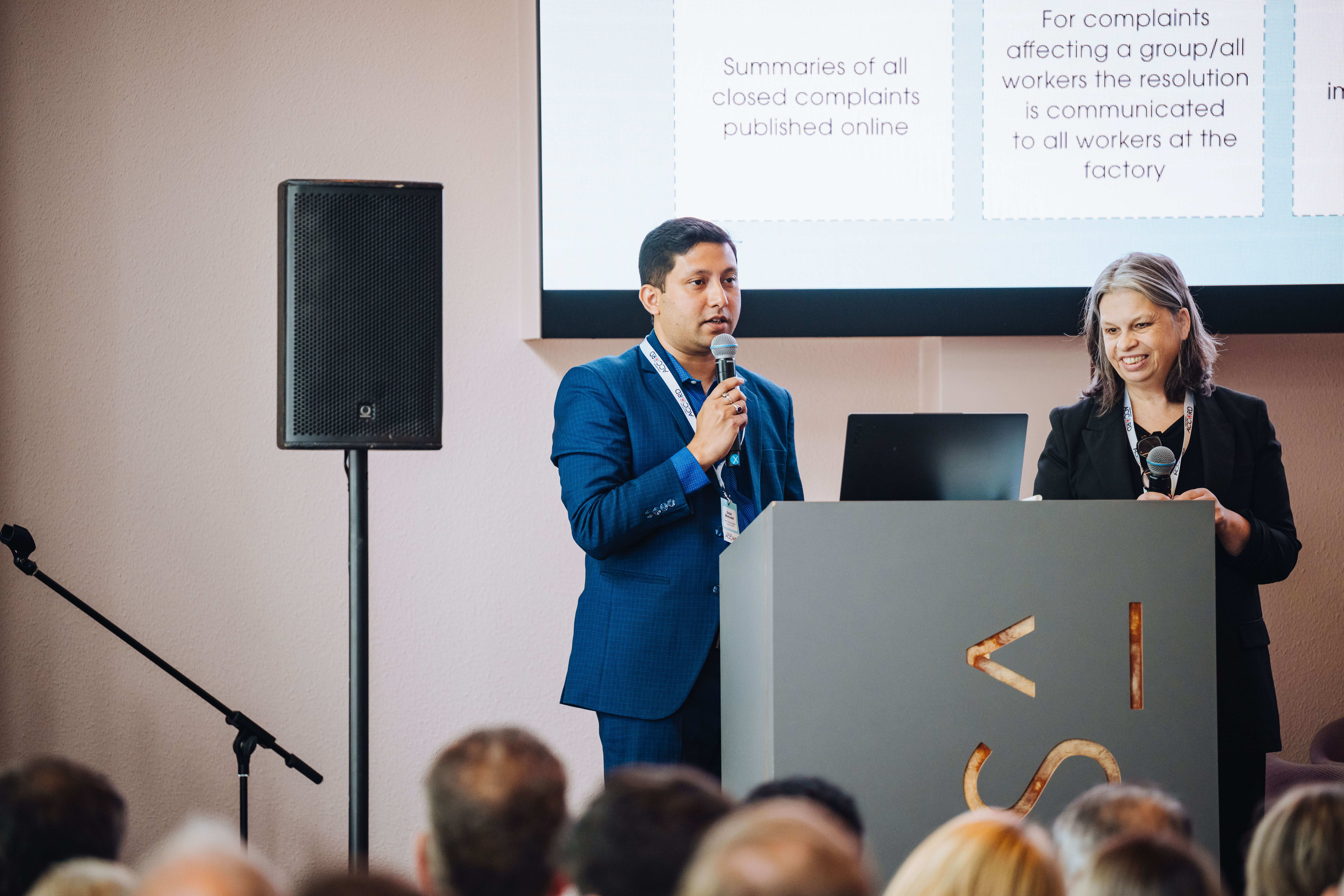
- Drew and Mutsuddi emphasised the core principles that define the Accord’s Complaints Mechanism—accessibility, legitimacy, confidentiality, enforceability and transparency. They also emphasised the dual role of a complaints mechanism – providing access to remedy for workers as well as information that brands and retailers can use to identify and prevent adverse impacts as part of their HRDD. They provided perspectives on both roles.
- They discussed the nature of complaints received and highlighted the differences between Bangladesh’s more mature system and the relatively nascent system in Pakistan. They also provided a breakdown of OSH versus non-OSH complaints, noting that the Accord’s Mechanism currently covers OSH-related issues.
- Mutsuddi shared data and analysis from Bangladesh. Common OSH-related complaints include maternity rights violations, workplace violence, sickness, and forced overtime. While non-OSH complains often involve issues such as wages, benefits and leave entitlements, and unfair terminations.
- Drew offered early-stage observations from the Pakistan Accord, describing a nascent system, with a smaller data set and a more dynamic and fluctuating distribution of complaints. OSH-related issues in Pakistan include forced overtime, workplace injuries, lack of drinking water, and insufficient personal protective equipment (PPE). Non-OSH complaints typically involve non-payment of wages and overtime, especially for contract workers.
A dynamic Q&A session followed, featuring insights from Lena Peleikis, Head of Human Rights & Responsible Supply Chain at the Otto Group, and Christina Hajagos-Clausen, Director of the Textile and Garment Industry at IndustriALL. They discussed the strategic role brands and trade unions can play in strengthening the Mechanism.
The session explored the potential for expanding the scope of the Complaints Mechanism beyond OSH. It also provided suggestions on how brands and retailers can more effectively collaborate in using the data from the Accord Complaints Mechanism for identifying risks and preventing adverse impacts, including by using the structures of the Accord.
Rotating Breakout Sessions
Following the lunch break, smaller participant groups engaged in three rotating breakout sessions:
- Launch of the Accord Signatory Portal: Led by Adelia Arista (Data Analysis & Systems Coordinator) and Colm Quinn (Head of Operations), this session introduced the new internal portal designed for Pakistan Accord signatories as part of the Accord’s broader digital transition. Arista demonstrated key functionalities of the portal and explained how it streamlines access to information about factory progress in Pakistan for signatories.
- Factory Disclosure under the Accord: Facilitated by Koen Oosterom (Head of Signatory Engagement), this session focused on the factory disclosure process under the Accord. Oosterom outlined the requirements and process for signatories to list factories under the Accord, emphasising its central role in ensuring supply chain transparency and accountability.
- External Session by ILO: Employment Injury Scheme Pilot in Bangladesh: Hosted by Dr. Anne Marie La Rosa (ILO), this session explored ILO’s Employment Injury Scheme Pilot in Bangladesh. Dr. La Rosa presented the business case for responsible supply chains, highlighting how the pilot supports worker protections and improves supply chain monitoring for brands.
Accord Expansion, Pakistan Accord Renewal and Brand Caucus
Following the breakout sessions, Oldenziel presented insights into the expansion of the Accord to other countries. The session provided an opportunity for signatories to discuss their interest in expanding the Accord’s work, informed by key findings from a brand survey conducted in March 2025.
The survey results included details on major sourcing countries, the types of supplier facilities involved and priority countries for potential expansion.
In recognition of the need for continued work in Pakistan, brands and trade unions engaged in a discussion around the upcoming negotiations and renewal of the Pakistan Accord. The session focused on the key considerations necessary to ensure the continuity and further strengthening of the Accord’s commitments in Pakistan.
On 22 May, Accord signatory brands convened a Brand Caucus to discuss important topics among peers. Discussions covered the renewal of the Pakistan Accord, the potential expansion of the Complaints Mechanism to address non-OSH grievances, and the Accord’s expansion to other countries.
We extend our sincere thanks to all attendees for their openness, insights, and recommendations, which are critical to effectively implementing the Accord’s programs and contributing to a safer and more responsible garment and textile industry. We also thank our moderator, Olivia Windham Stewart, and the Hotel Casa team for their invaluable organisational support in making this event possible.
For more information, contact:
- media@internationalaccord.org
- Mini Dixit, Communications Advisor: mini.dixit@internationalaccord.org
Related updates
May 28, 2025
The International Accord’s All Signatory Meeting was dedicated to insights on the progress and operations of the Accord’s country program in Bangladesh and Pakistan, alongside exploring opportunities to expand the Accord’s scope and impact.
March 10, 2025
This briefing provides updates on the number of signatory brands and covered factories, the rollout of Workplace Programs, and recent events organised by the Pakistan Accord team.
February 19, 2025
The Pakistan Accord team recently organised a series of capacity building workshops for government officials in the Sindh and Punjab provinces.
May 28, 2025
The International Accord’s All Signatory Meeting was dedicated to insights on the progress and operations of the Accord’s country program in Bangladesh and Pakistan, alongside exploring opportunities to expand the Accord’s scope and impact.
February 19, 2025
The Pakistan Accord team recently organised a series of capacity building workshops for government officials in the Sindh and Punjab provinces.
November 28, 2024
On 26 and 27 November 2024 the Pakistan Accord conducted its inaugural safety training meeting in Pakistan. The meeting was attended by all employees of the factory.
Capacity Building Workshops for Government Officials in Sindh and Punjab
Updates
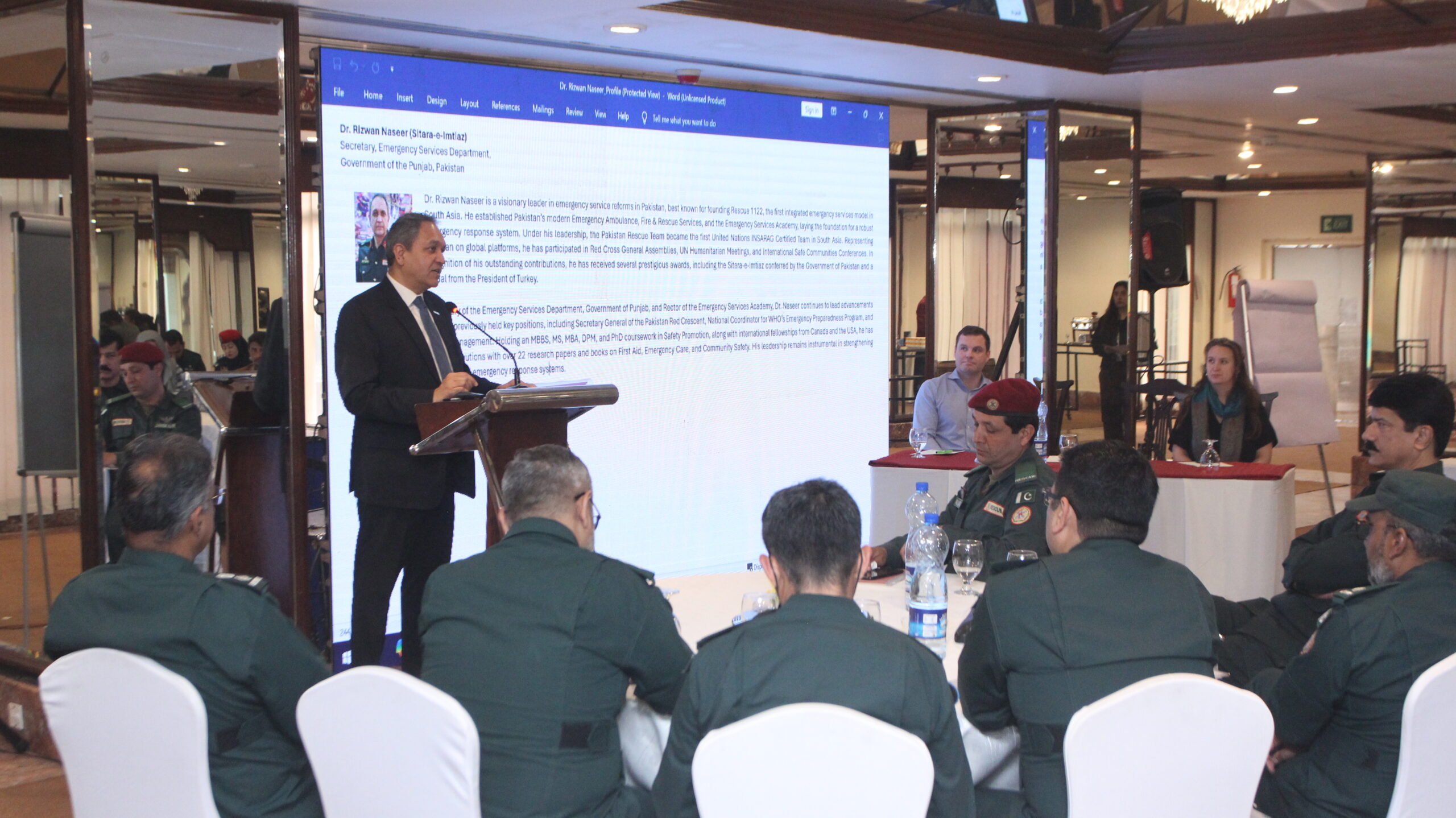
The Pakistan Accord team recently organised a series of capacity building workshops for government officials in the Sindh and Punjab provinces.
The first workshop took place in Karachi from 3 to 7 February, 2025, and was attended by over 70 participants representing eight government departments. These included the Sindh Building Control Authority, Department of Labour and Human Resources, Sindh Emergency Service Department, Civil Defense, K Electric, Fire Brigade Department, and NED University of Engineering and Technology.
The second workshop, held in Lahore from 10 to 14 February, 2025, was also attended by an equal number of participants representing seven departments, including Lahore Development Authority, Faisalabad Development Authority, Department of Labour and Human Resources, Rescue 1122, Civil Defense, UET, NESPAK, and LESCO.
The workshop modules delivered by expert engineers from Arup, included technical and non-technical aspects of building safety, fire safety, and electrical safety, along with an overview of the approval process and regulatory mechanisms in existence in Pakistan. Participants were also exposed to international standards and requirements in the field.
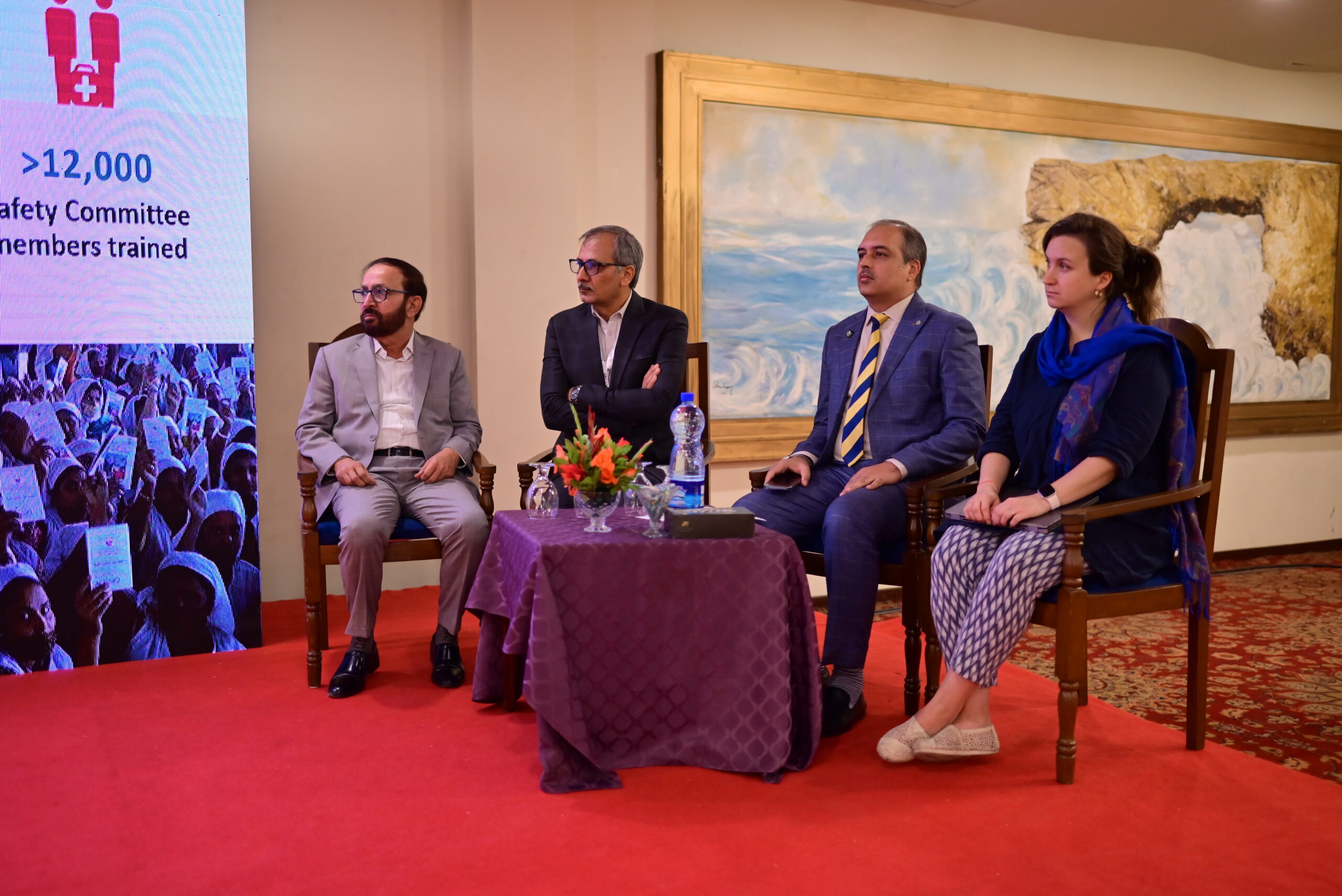
The five-day workshops also provided an opportunity for participants from these departments to engage in mutual learning and sharing, in addition to networking and socialising. The factory visits arranged for a limited number of participants also generated great interest among attendees, along with on-site explanations of various aspects of building safety.
The workshop in Karachi was jointly inaugurated by Dr. Abid Shaikh, Director General of Sindh Emergency Services, and Mr. Athar Ali Shah, Joint Director of the Department of Labour and Human Resources.
In Lahore, Dr. Rizwan Naseer, DG of Rescue 1122, was the Chief Guest at the inaugural session, while Syeda Kulsoom Hayee, DG of Labour Welfare, was the Chief uest at the closing ceremony and distributed certificates among the participants.

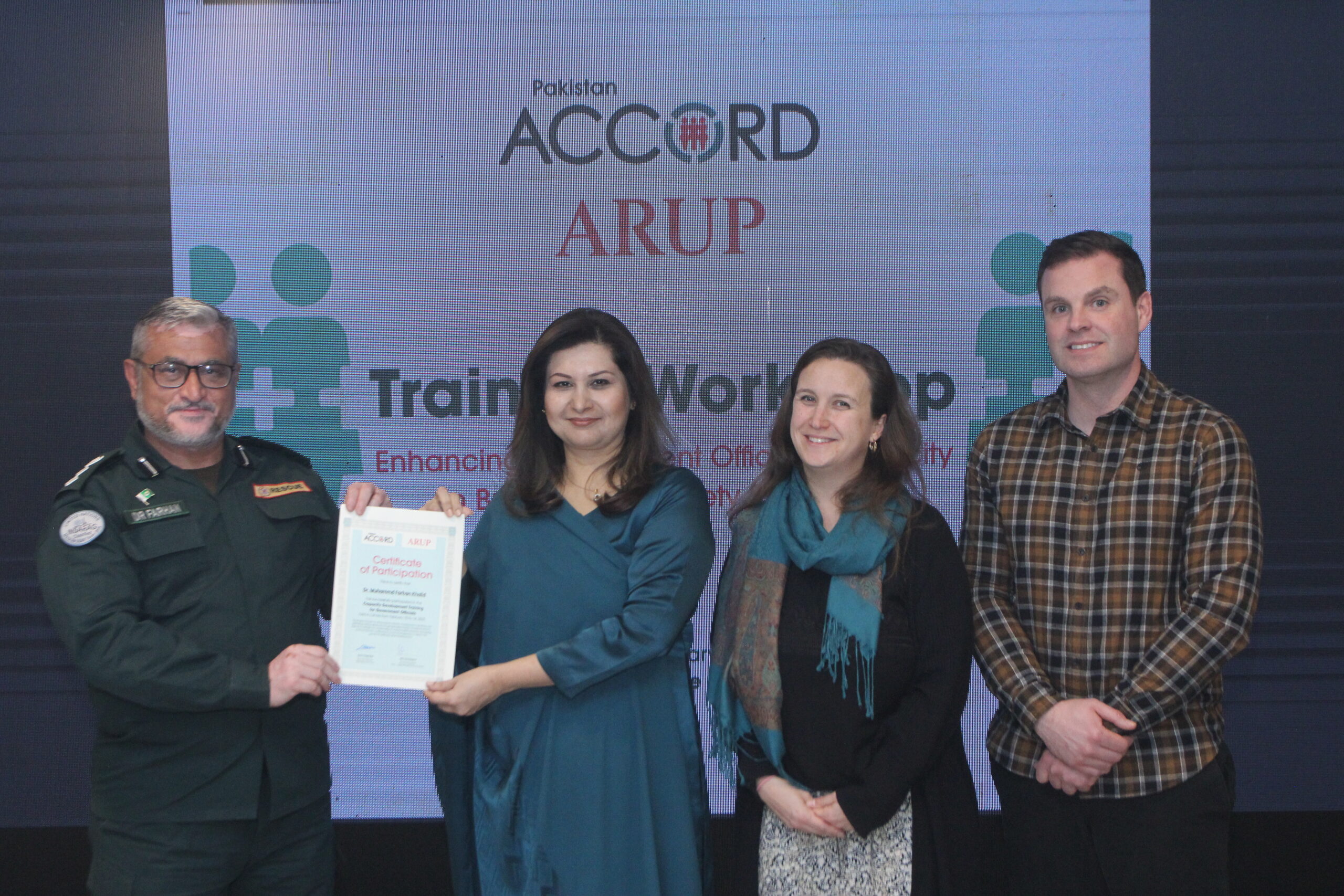
In addition to key trainers Ms. Vita Sanderson, Kenneth Wynne, and Mr. Will from Arup, Mr. Joris Oldenziel, Executive Director of International Accord, Mr. Colm Quinn, Interim Chief Safety Officer, and Mr. Zulfiqar Shah, Country Director of Pakistan Accord, specially participated in the training program.
The Pakistan Accord hopes to contribute to enhancing the capacity of relevant government departments, fostering a stronger safety culture across all workplaces in Pakistan.
Resources:
Related updates
May 28, 2025
The International Accord’s All Signatory Meeting was dedicated to insights on the progress and operations of the Accord’s country program in Bangladesh and Pakistan, alongside exploring opportunities to expand the Accord’s scope and impact.
March 10, 2025
This briefing provides updates on the number of signatory brands and covered factories, the rollout of Workplace Programs, and recent events organised by the Pakistan Accord team.
February 19, 2025
The Pakistan Accord team recently organised a series of capacity building workshops for government officials in the Sindh and Punjab provinces.
May 28, 2025
The International Accord’s All Signatory Meeting was dedicated to insights on the progress and operations of the Accord’s country program in Bangladesh and Pakistan, alongside exploring opportunities to expand the Accord’s scope and impact.
February 19, 2025
The Pakistan Accord team recently organised a series of capacity building workshops for government officials in the Sindh and Punjab provinces.
November 28, 2024
On 26 and 27 November 2024 the Pakistan Accord conducted its inaugural safety training meeting in Pakistan. The meeting was attended by all employees of the factory.
Pakistan Accord Holds its first All Employee Meeting in Pakistan
Updates
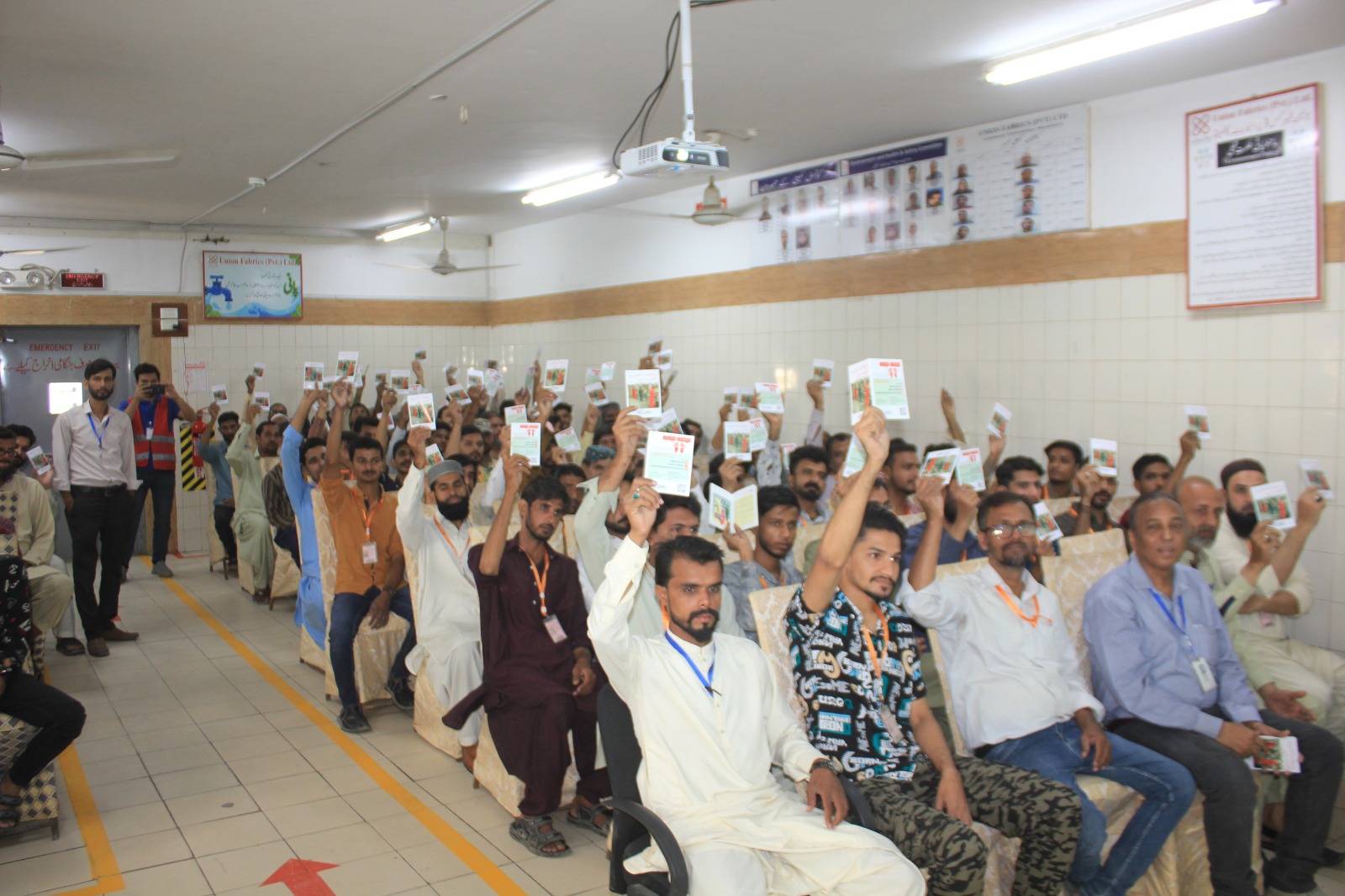
On 26 and 27 November 2024 the Pakistan Accord conducted its inaugural safety training meeting in Pakistan at Union Fabrics (Pvt.) Limited, a home textile manufacturing facility located in Karachi. The meeting was attended by all employees of the factory.
Opening remarks
During the opening remarks of the kick-off training session, Kirstine Drew, Chief Complaints Officer at Accord Pakistan, first provided an overview of the Pakistan Accord program in Pakistan.
Zulfiqar Shah, Country Manager of Pakistan Accord, later addressed the attendees, underlining the importance of the Safety Training Program.
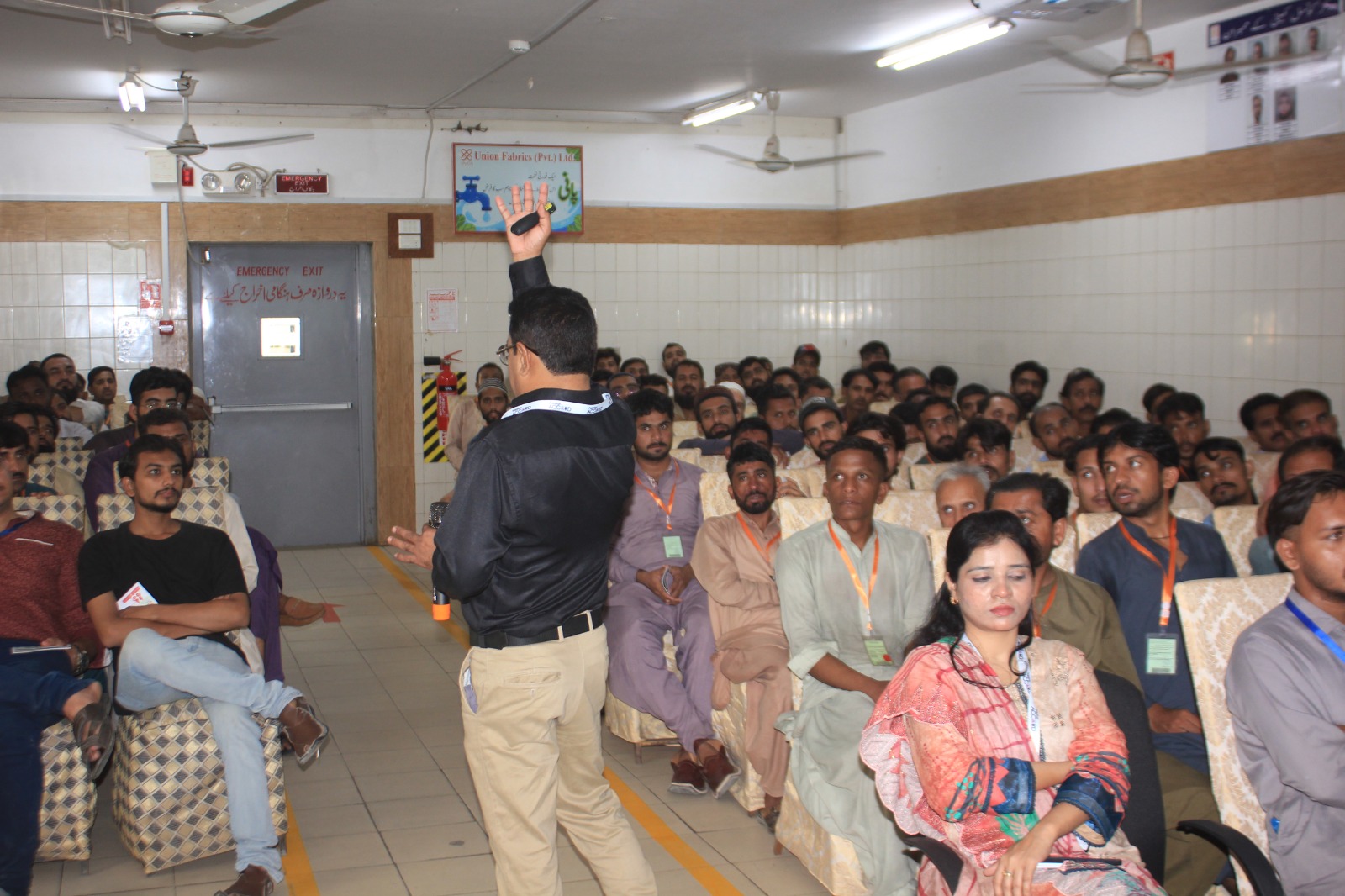
Training sessions
The topic of the training was ‘Rights and Responsibilities under the Pakistan Accord and Introduction to the Safety Committee’. During the training, Safety Committee members were introduced to the participants and given the opportunity to explain their roles and responsibilities for safety and health within the factory.
Six sessions were held over two days, with active participation from the workers. The sessions were led by three members of the Pakistan Accord Training team: Mr. Numair Aman, Mr. Abdul Qadir and Mr. Murtuza Ahmed.
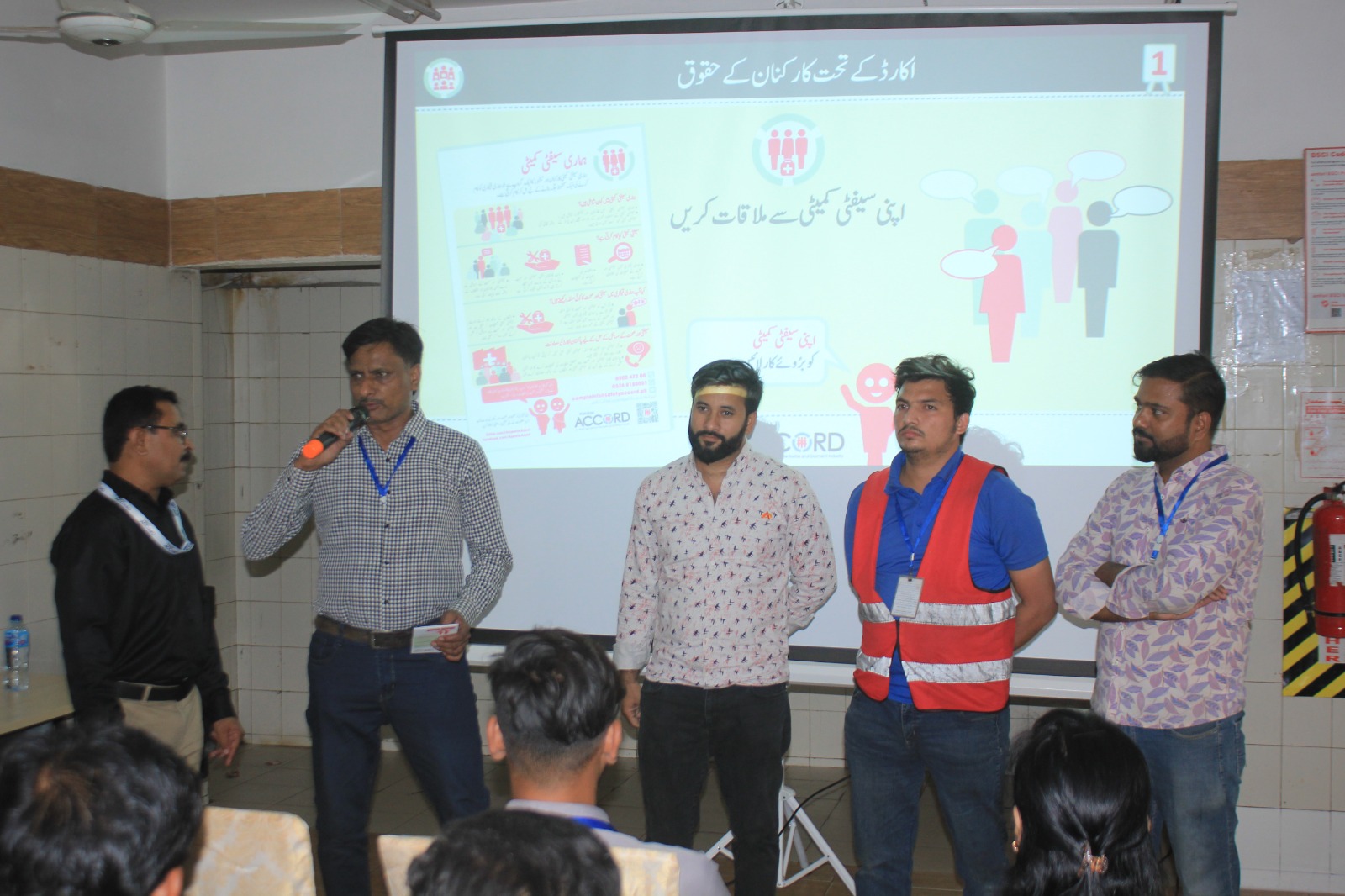
All participants were provided with a booklet on the rights and responsibilities of workers under the Pakistan Accord. Posters and large Panaflex banners describing the role of the Safety Committee and providing contact information for the Pakistan Accord were posted in strategic locations throughout the facility, including the worker canteen, main gate, and assembly points.
The sessions were conducted in Urdu and all accompanying materials printed in Urdu.
The Pakistan Accord extends its gratitude to the management of Union Fabrics for its support in facilitating the first Pakistan Accord All Employee Meeting in Pakistan.
Resources:
Related updates
May 28, 2025
The International Accord’s All Signatory Meeting was dedicated to insights on the progress and operations of the Accord’s country program in Bangladesh and Pakistan, alongside exploring opportunities to expand the Accord’s scope and impact.
March 10, 2025
This briefing provides updates on the number of signatory brands and covered factories, the rollout of Workplace Programs, and recent events organised by the Pakistan Accord team.
February 19, 2025
The Pakistan Accord team recently organised a series of capacity building workshops for government officials in the Sindh and Punjab provinces.
May 28, 2025
The International Accord’s All Signatory Meeting was dedicated to insights on the progress and operations of the Accord’s country program in Bangladesh and Pakistan, alongside exploring opportunities to expand the Accord’s scope and impact.
February 19, 2025
The Pakistan Accord team recently organised a series of capacity building workshops for government officials in the Sindh and Punjab provinces.
November 28, 2024
On 26 and 27 November 2024 the Pakistan Accord conducted its inaugural safety training meeting in Pakistan. The meeting was attended by all employees of the factory.
Rollout of Pakistan Accord Workplace Programs
Updates

The Pakistan Accord Secretariat hosted a briefing on the rollout of Workplace Programs on August 19, 2024, in Karachi. Over 70 participants representing 30 covered factories attended the orientation session. The International Labour Organisation (ILO) and Deutsche Gesellschaft für Internationale Zusammenarbeit (GIZ) also attended the session as special invitees.
The event featured a panel discussion and a detailed briefing, providing participants with an opportunity to ask questions and provide feedback.
The Workplace Program, which includes Safety Training and a Complaints Mechanism at covered factories, is a key component of the Pakistan Accord. It aims to help build the capacity of joint labour management Safety Committees to maintain safe workplaces, raise workers’ awareness of safety and health, ensure compliance with OSH-related requirements, and provide workers with access to remedies.
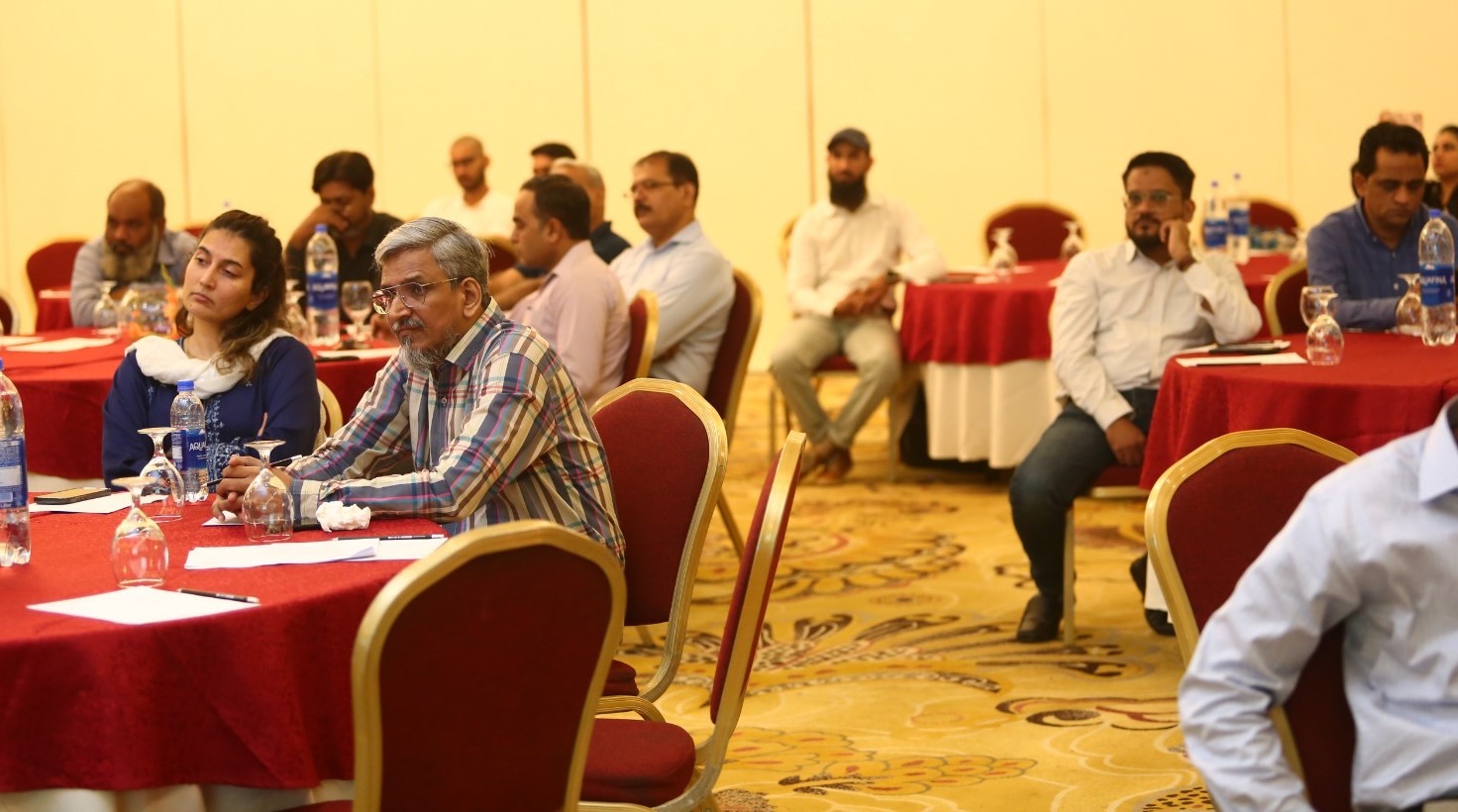
Zulfiqar Shah, Country Manager of the Pakistan Accord, highlighted the importance of workplace safety in his opening remarks. He also expressed appreciation for the cooperation extended by key stakeholders, particularly the factories.
He provided an update to the participants, stating that the Pakistan Accord on Health and Safety in the Textile and Garment Industry, a legally binding agreement between global brands and unions, took effect in January 2023. To date,128 brands that collectively source over $3 billion worth of goods from 500 factories in Pakistan’s Sindh and Punjab provinces have signed the agreement. The program aims to reach over 500,000 workers through its safety training program and has conducted safety inspections in over 80 factories.
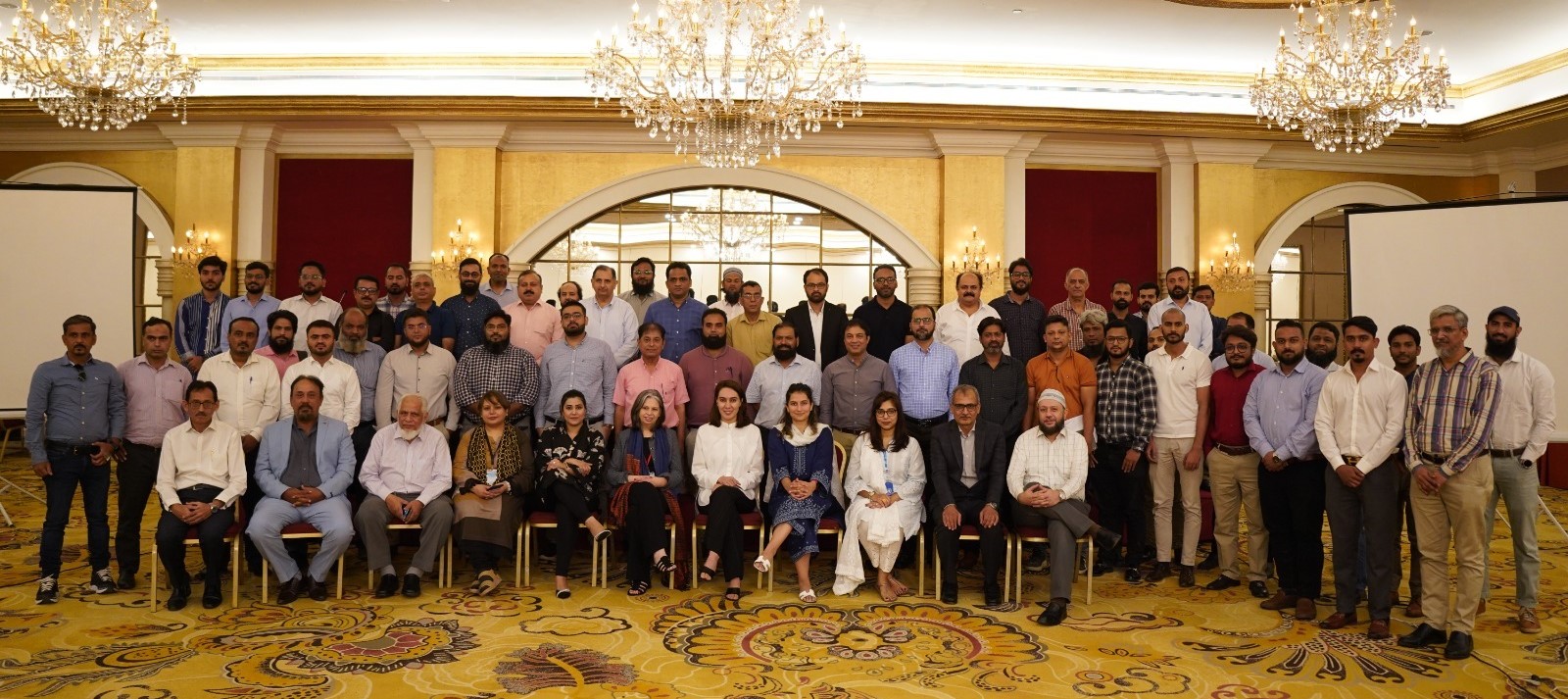
Kirstine Drew, Chief Complaints Officer, Pakistan Accord explained in her presentation that the right to refuse unsafe work, provision of safety training programs, joint labour management Safety Committees, and the Complaints Mechanism are the cornerstones of worker participation in the Accord program.
The Pakistan Accord Safety Training program is made up of two parts: All Employee Meetings (AEMs), which are informational sessions attended by all workers of the factory, covering topics such as evacuation, health and safety risks, and workers’ rights and responsibilities regarding workplace safety. The second component is the Safety Committee Training Program, which includes both mandatory and optional modules. These modules cover various issues, including the role of Safety Committees in handling workers’ complaints and the organisation of factory walkthroughs.
The complaints mechanism is implemented on behalf of signatory brands and in accordance with UN effectiveness criteria – legitimate, accessible, predictable, equitable, transparent, rights-compatible – as well as the requirements of due diligence legislation. The Accord team works with factory management and brands to address complaints and ensure the delivery of remedies.
Workers at covered factories can submit complaints via the following channels:
WhatsApp: +92 326 8180001 Local No: 0326 8180001 Email: complaints@safetyaccord.pk
In the panel discussion, Rehan Ahmedani, representing Synergies Sourcing, and Neelofar Saleem, representing Bestseller, emphasised that having an independent complaints mechanism in place is now a legal requirement for brands under various legislations in Europe, such as the German Supply Chain Act and the EU Corporate Sustainability Due Diligence Directive (CSDDD).
Both speakers noted that receiving complaints is not necessarily ‘bad’, and they prefer to work with suppliers who have efficient and effective systems to address them.
They also encouraged supplier factories to embrace the Safety Training Program as an opportunity to strengthen workplace safety and health and contribute to learning.
During the Q&A session, participating factories highlighted the challenges they face due to the presence of multiple complaints mechanisms within their facilities, expressing concern that having various grievance mechanisms in the same location confuses workers.
The event concluded with a collective commitment to work together to make workplaces safer for factory workers. The Pakistan Accord Secretariat is planning to organise similar informational sessions with additional covered factories in Lahore and Karachi.
Resources:
Related updates
May 28, 2025
The International Accord’s All Signatory Meeting was dedicated to insights on the progress and operations of the Accord’s country program in Bangladesh and Pakistan, alongside exploring opportunities to expand the Accord’s scope and impact.
March 10, 2025
This briefing provides updates on the number of signatory brands and covered factories, the rollout of Workplace Programs, and recent events organised by the Pakistan Accord team.
February 19, 2025
The Pakistan Accord team recently organised a series of capacity building workshops for government officials in the Sindh and Punjab provinces.
May 28, 2025
The International Accord’s All Signatory Meeting was dedicated to insights on the progress and operations of the Accord’s country program in Bangladesh and Pakistan, alongside exploring opportunities to expand the Accord’s scope and impact.
February 19, 2025
The Pakistan Accord team recently organised a series of capacity building workshops for government officials in the Sindh and Punjab provinces.
November 28, 2024
On 26 and 27 November 2024 the Pakistan Accord conducted its inaugural safety training meeting in Pakistan. The meeting was attended by all employees of the factory.
International Accord Statement on the Political Situation in Bangladesh
Updates
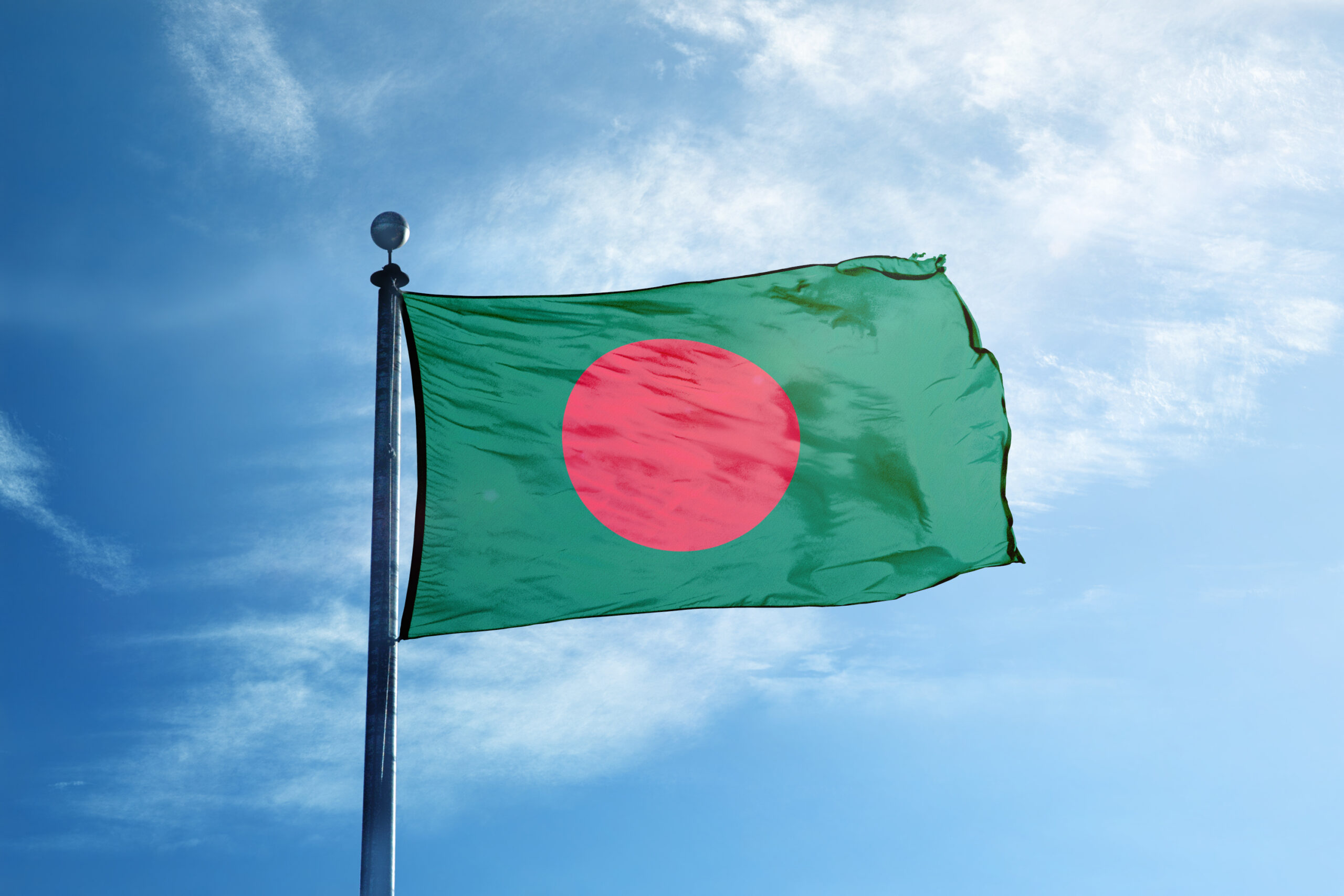
Statement
Amsterdam, 08 August 2024:
In view of the complex political situation in Bangladesh, the International Accord makes the following statement in solidarity with the people of Bangladesh.
The International Accord is deeply concerned about the breakdown in law and order and the ensuing violence in Bangladesh and its impact on the two million workers in Accord-covered factories and our partners in the RMG industry.
It is not possible at this stage to assess the impact current events will have on the RMG industry given the rapidly changing situation. In these uncertain times, the International Accord calls on all signatories of the Bangladesh Safety Agreement[1] to stand by their Bangladeshi industry partners with patience in order to support the economic future of the country.
We urge all signatories to:
- Uphold the letter and the spirit of the commitments made to maintain a long-term sourcing relationship with Bangladesh.
- Actively engage with your suppliers to work together and address challenges related to production targets, order deliveries and the safety and health of workers.
- Continue supporting the RMG Sustainability Council (RSC) throughout this challenging period.
In addition, we have also learnt of, as yet unverified, reports of vandalism and fires at some RMG factories in Bangladesh. Any safety incidents at covered factories will be investigated by the RSC in accordance with their operating procedures, to the extent possible under the circumstances.
The International Accord will work to the best of its ability, together with colleagues from the RSC, Accord brands, trade unions, witness signatories and industry, to provide ongoing support and ensure that commitments made on safety and health protections are upheld. These include upholding the right to refuse unsafe work, maintaining regular income during any period a factory is closed for safety reasons, and avoiding excessive working hours to make up for production delays.
The International Accord hopes that Bangladesh quickly returns to a state of political and social stability and that we can continue our collective journey towards a safe and sustainable RMG industry in Bangladesh.
Our thoughts and prayers are with the people of Bangladesh.
[1] The Bangladesh Safety Agreement is a Country-Specific Safety Program that is an addendum to the International Accord framework agreement and has been signed by 201 garment brands and retailers.
END
For more information, contact:
- media@internationalaccord.org
- Mini Dixit, Communications Advisor: mini.dixit@internationalaccord.org
Related updates
May 28, 2025
The International Accord’s All Signatory Meeting was dedicated to insights on the progress and operations of the Accord’s country program in Bangladesh and Pakistan, alongside exploring opportunities to expand the Accord’s scope and impact.
March 10, 2025
This briefing provides updates on the number of signatory brands and covered factories, the rollout of Workplace Programs, and recent events organised by the Pakistan Accord team.
February 19, 2025
The Pakistan Accord team recently organised a series of capacity building workshops for government officials in the Sindh and Punjab provinces.
May 28, 2025
The International Accord’s All Signatory Meeting was dedicated to insights on the progress and operations of the Accord’s country program in Bangladesh and Pakistan, alongside exploring opportunities to expand the Accord’s scope and impact.
February 19, 2025
The Pakistan Accord team recently organised a series of capacity building workshops for government officials in the Sindh and Punjab provinces.
November 28, 2024
On 26 and 27 November 2024 the Pakistan Accord conducted its inaugural safety training meeting in Pakistan. The meeting was attended by all employees of the factory.
Day 2 Recap: Accord All Signatory Meeting 2024
Updates

The International Accord held its All Signatory Meeting 2024 on the 25 and 26 of April 2024 at the Rode Hoed in Amsterdam, the Netherlands. The purpose of the event was to update participants about the key developments on the operations and implementation of the Accord’s Country-Specific Safety Programs (CSSPs) in Bangladesh and Pakistan.
26 April marked the second day of the International Accord‘s All Signatory Meeting highlighted the Pakistan Accord and welcomed the participation of over 30 suppliers from the Pakistani textile and garment industry.
The event brought together global brands and retailers including Adidas, Mango, Primark, Lidl, Matalan, PVH, Puma, Zalando, Kik Textilien, GAP Inc, ASOS, AEO Inc. H&M, Inditex and Bestseller.
Participation from the Pakistani textile and garment industry included nearly 30 representatives. Additionally, this day saw representation from the International Apparel Federation (IAF).
The day began with opening remarks from Michelle Tarry of American Eagle Outfitters Inc (AEO) emphasising the key role of the Accord’s remediation plans and worker training in promoting and maintaining workplace safety at their sourcing facilities. Tarry further underscored AEO’s commitment to the Pakistan Accord, stating:
We are in a position to extend the achievements from Bangladesh to Pakistan. While our production in Pakistan has been limited thus far; our recent visits have left us impressed with the industry’s investments in safety infrastructure, sustainability, and innovation. In the coming years, we see significant growth potential in Pakistan and remain committed to the well-being of those making our products. The Pakistan Accord’s inspection program, training initiatives, and complaints mechanism will be instrumental in this journey.
Koen Oosterom and Zulfiqar Shah, offered updates on the operations of the Pakistan Accord, followed by a discussion on the inspections and remediation programs by the Accord’s George Faller, Colm Quinn, and Veronique Camerer who elaborated on the importance of planning factory remediation and the available tools to ensure that it is financially feasible for factories to correct safety risks.
The session concluded with insights from Zubaida Machiyara (Fashion Knit Industries) and Yasir Yaqoob (Lucky Textile Mills), who shared their experiences of participating in the initial inspections under the Pakistan Accord.
The panel on the Accord’s workplace programs featured observations by David Reiner (Zalando), Matthijs Crietee (IAF: International Apparel Federation), Christina Hajagos-Clausen (IndustriALL Global Union ), and Kirstine Drew (Pakistan Accord) who echoed the importance of collaboration among all actors in ensuring access to remedy through the Accord’s complaints mechanism.
The last session featured valuable recommendations from suppliers to implement the Pakistan Accord. Key suggestions emphasised prioritising transparency, facilitating knowledge exchange, nurturing business stability, and embracing collaborative models tailored to accommodate facilities of all sizes.
Muhammed Rehan Ahmendani (Executive Director, Synergies Worldwide) shared:
“The arrival of the Accord in Pakistan is not a challenge but an opportunity. It is logical to understand that a safer workforce means more brands and, consequently, more business. The Accord is skillful and focuses on fostering strong business relations between brands and suppliers. Moving forward, I recommend that brands remain committed to the program and embrace new ideas to ensure worker safety, with a special focus on digitisation.”
We thank our panelists, Azfar Hasan (Matrix Sourcing), Kaschif R. Israr (Euro Centra Pakistan), Aamir Chottani (CHOTTANI INDUSTRIES.), Muhammed Rehan Ahmedani (Synergies Worldwide), Michael Bride and Veronique Camerer for their invaluable insights.
Lastly, we thank all attendees for their openness, insights, and recommendations, which are crucial to effectively implementing the Pakistan Accord and contributing to a safer garment and textile industry.
We thank our moderator, Olivia Windham Stewart and the Amerpodia team for the organisational support on this event.
For more information, contact:
- media@internationalaccord.org
- Mini Dixit, Communications Advisor: mini.dixit@internationalaccord.org
Related updates
May 28, 2025
The International Accord’s All Signatory Meeting was dedicated to insights on the progress and operations of the Accord’s country program in Bangladesh and Pakistan, alongside exploring opportunities to expand the Accord’s scope and impact.
March 10, 2025
This briefing provides updates on the number of signatory brands and covered factories, the rollout of Workplace Programs, and recent events organised by the Pakistan Accord team.
February 19, 2025
The Pakistan Accord team recently organised a series of capacity building workshops for government officials in the Sindh and Punjab provinces.
May 28, 2025
The International Accord’s All Signatory Meeting was dedicated to insights on the progress and operations of the Accord’s country program in Bangladesh and Pakistan, alongside exploring opportunities to expand the Accord’s scope and impact.
February 19, 2025
The Pakistan Accord team recently organised a series of capacity building workshops for government officials in the Sindh and Punjab provinces.
November 28, 2024
On 26 and 27 November 2024 the Pakistan Accord conducted its inaugural safety training meeting in Pakistan. The meeting was attended by all employees of the factory.
Day 1 Recap: Accord All Signatory Meeting 2024
Updates
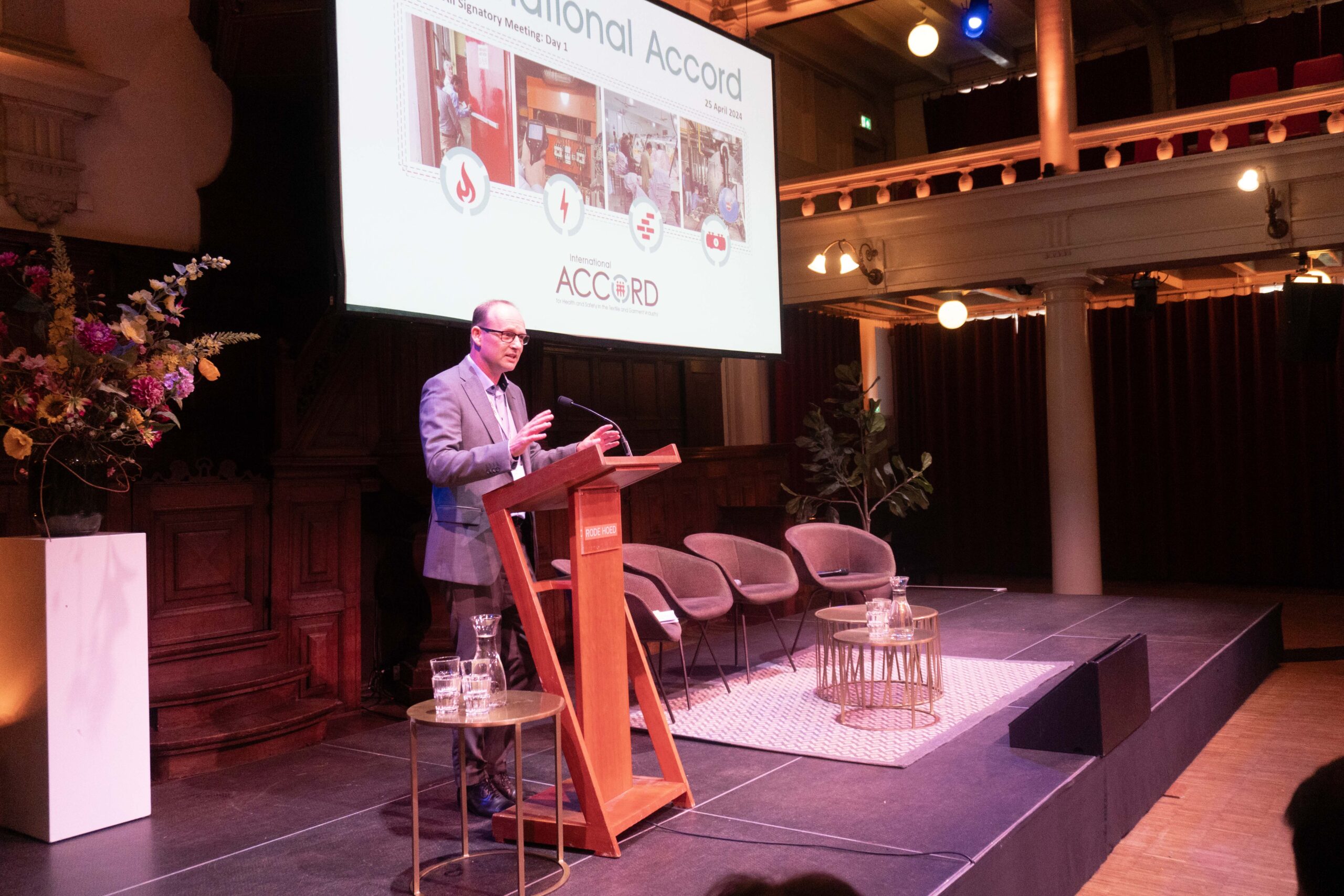
The International Accord held its All Signatory Meeting 2024 on the 25 and 26 of April 2024 at the Rode Hoed in Amsterdam, the Netherlands. The purpose of the event was to update participants about the key developments on the operations and implementation of the Accord’s Country-Specific Safety Programs (CSSPs) in Bangladesh and Pakistan.
25 April marked the first day of the All-Signatory Meeting in Amsterdam, where our brand, trade union, and NGO signatories came together to discuss the progress and way ahead on the International Accord and the Bangladesh Safety Agreement.
Set against the background of the 11th anniversary of the Rana Plaza collapse on 24 April, the day started with remarks by Christina Hajagos-Clausen (IndustriALL Global Union) and Joachim Juette-Overmeyer (Otto Group).
Dorothy Lovell (Sector Lead – Garment & Footwear, OECD Centre for Responsible Business Conduct), in her keynote address, underscored the Accord’s role as a flagship initiative that translates the OECD’s Due Diligence Guidance into action. She described it as a tool for accountability and an example of how due diligence creates impactful change by preventing harm, improving lives, and ensuring business continuity. Lovell added:
“…when brands jointly invest in the conditions for decent work in their supply chain, there are results, and those results are good for workers and business.”
The day included updates on the International Accord’s operations by Joris Oldenziel and Koen Oosterom.
Veronique Camerer and Kristine Drew conducted a session that encouraged brands to share their perspectives and insights on the steps they take to fulfill their obligations on financing remediation and the Accord’s workplace programs.
The RMG Sustainability Council (RSC)’s Abdul Haque, Shah Sefat Uddin Ahmed and Md Hassan Nawazis shared a comprehensive presentation on the remediation progress in Bangladesh, highlighting key developments such as the expansion of the complaints mechanism and the envisioned environmental program.
The final session comprised reflections on the Bangladesh Safety Program by Miran Ali (BGMEA), Ineke Zeldenrust (Clean Clothes Campaign), Christina Hajagos-Clausen, and Joachim Juette-Overmeyer, followed by concluding remarks delivered by PVH Corp.’s Michael Bride.
We thank all attendees for their participation, and Olivia Windham Stewart for moderating the sessions. We are also grateful to our venue partners, the Amerpodia team for their organisational support on this event.
For more information, contact:
- media@internationalaccord.org
- Mini Dixit, Communications Advisor: mini.dixit@internationalaccord.org
Related updates
May 28, 2025
The International Accord’s All Signatory Meeting was dedicated to insights on the progress and operations of the Accord’s country program in Bangladesh and Pakistan, alongside exploring opportunities to expand the Accord’s scope and impact.
March 10, 2025
This briefing provides updates on the number of signatory brands and covered factories, the rollout of Workplace Programs, and recent events organised by the Pakistan Accord team.
February 19, 2025
The Pakistan Accord team recently organised a series of capacity building workshops for government officials in the Sindh and Punjab provinces.
May 28, 2025
The International Accord’s All Signatory Meeting was dedicated to insights on the progress and operations of the Accord’s country program in Bangladesh and Pakistan, alongside exploring opportunities to expand the Accord’s scope and impact.
February 19, 2025
The Pakistan Accord team recently organised a series of capacity building workshops for government officials in the Sindh and Punjab provinces.
November 28, 2024
On 26 and 27 November 2024 the Pakistan Accord conducted its inaugural safety training meeting in Pakistan. The meeting was attended by all employees of the factory.
11 years since the Rana Plaza collapse in Bangladesh
Updates
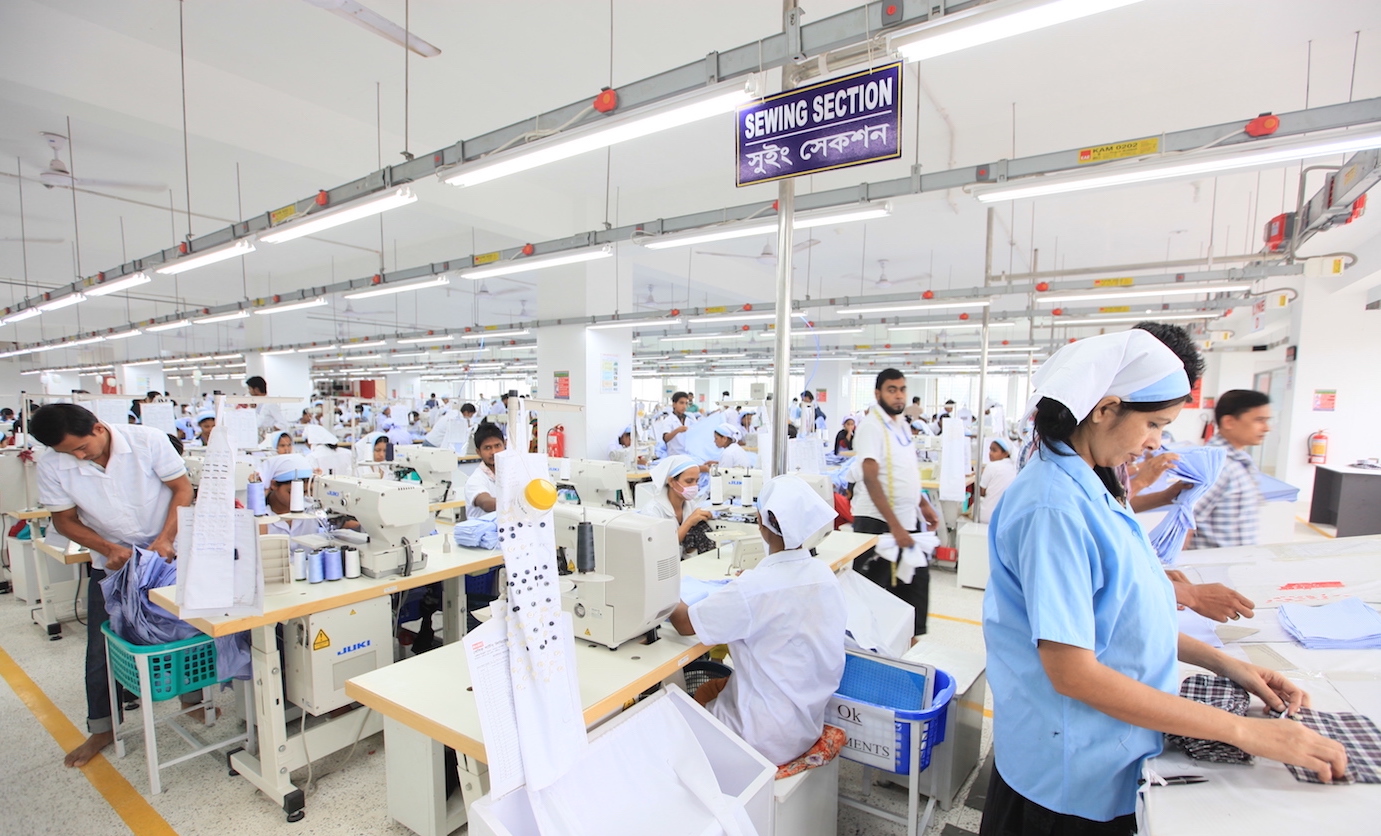
Today marks the 11th anniversary of the tragic collapse of the Rana Plaza building in Dhaka, Bangladesh, which claimed the lives of over 1,100 garment workers and left thousands critically injured. On this solemn anniversary, the Accord pays tribute to the victims, the survivors, and those enduring the impact of one of the most devastating workplace disasters in modern history.
Alongside our signatories and stakeholders, the Accord remains committed to ensuring that garment factory workers are safeguarded with a safe and healthy work environment as a fundamental principle and right at work.
We urge more brands to join us in this effort by signing the Accord and putting worker safety at the core of their garment supply chains.
For more information, contact:
- media@internationalaccord.org
- Mini Dixit, Communications Officer: mini.dixit@internationalaccord.org
Related updates
May 28, 2025
The International Accord’s All Signatory Meeting was dedicated to insights on the progress and operations of the Accord’s country program in Bangladesh and Pakistan, alongside exploring opportunities to expand the Accord’s scope and impact.
March 10, 2025
This briefing provides updates on the number of signatory brands and covered factories, the rollout of Workplace Programs, and recent events organised by the Pakistan Accord team.
February 19, 2025
The Pakistan Accord team recently organised a series of capacity building workshops for government officials in the Sindh and Punjab provinces.
May 28, 2025
The International Accord’s All Signatory Meeting was dedicated to insights on the progress and operations of the Accord’s country program in Bangladesh and Pakistan, alongside exploring opportunities to expand the Accord’s scope and impact.
February 19, 2025
The Pakistan Accord team recently organised a series of capacity building workshops for government officials in the Sindh and Punjab provinces.
November 28, 2024
On 26 and 27 November 2024 the Pakistan Accord conducted its inaugural safety training meeting in Pakistan. The meeting was attended by all employees of the factory.
Start of capacity building program for Pakistan Accord engineers
Updates
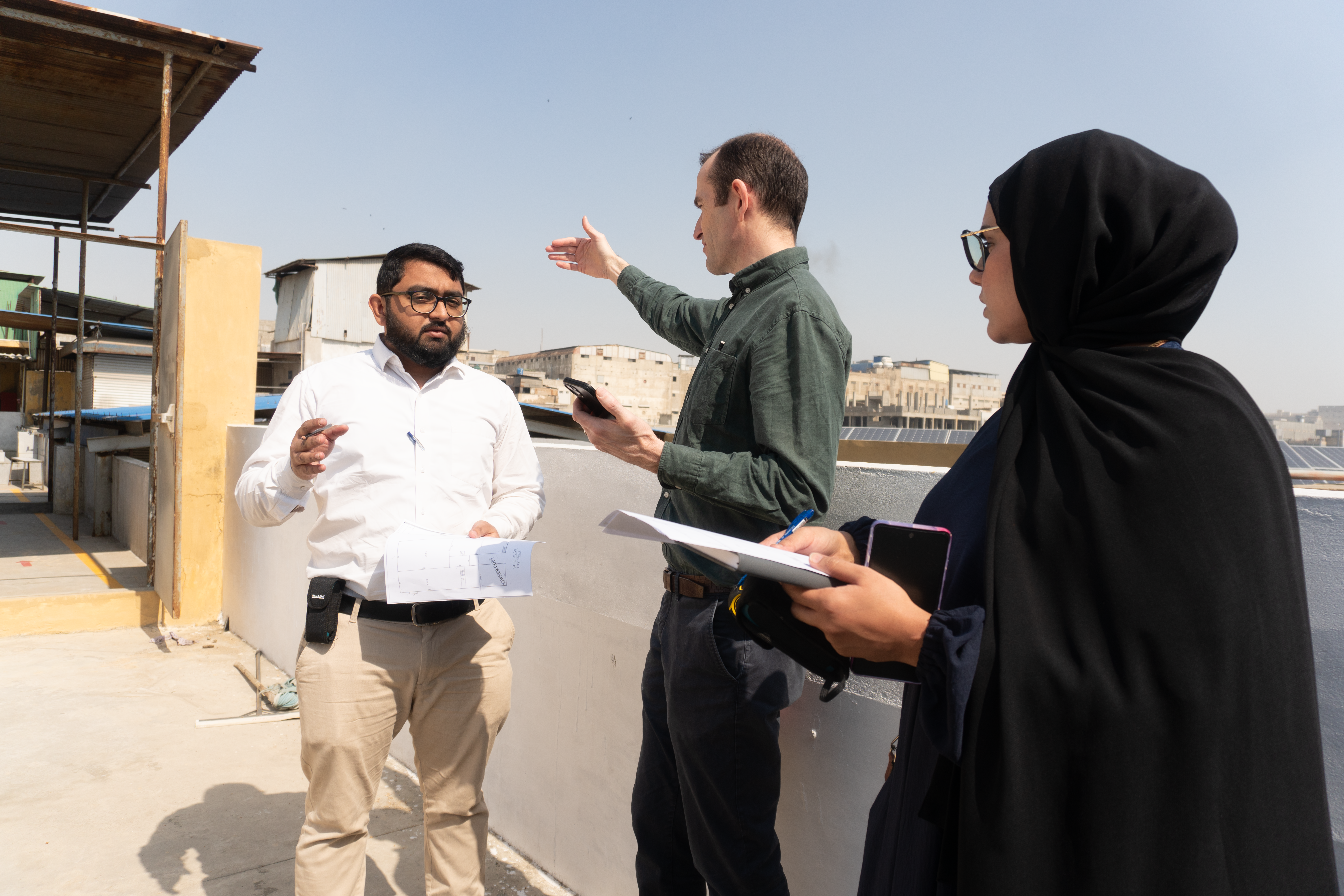
Marking a milestone in the rollout of the International Accord’s country program in Pakistan, newly hired engineers are undergoing training. The capacity-building program aims to equip engineers with the technical knowledge and practical skills necessary to effectively conduct factory inspections and produce reports that identify remediation required under the Pakistan Accord.
The program is currently underway in Karachi, Faisalabad and Lahore, Pakistan, and spans 9 weeks (with a two week break over Eid). In this inaugural batch, 14 engineers (including 5 fire engineers, 5 electrical engineers, 4 structural engineers) are undergoing training facilitated by engineering consultants, alongside George Faller (Chief Safety Officer, Pakistan Accord) and Colm Quinn (Head of Operations, International Accord).
The Capacity Building Program
The capacity building program comprises two phases focusing on classroom and on-the-job training. The initial three days emphasise introducing engineers to key Accord principles, the Pakistan Accord Building Standard, and essential key safety inspections features. Additionally, classroom sessions familiarise engineers with key safety hazards to look out for during factory assessments, and capturing this key information in reports used to develop factory Corrective Action Plans (CAPs).
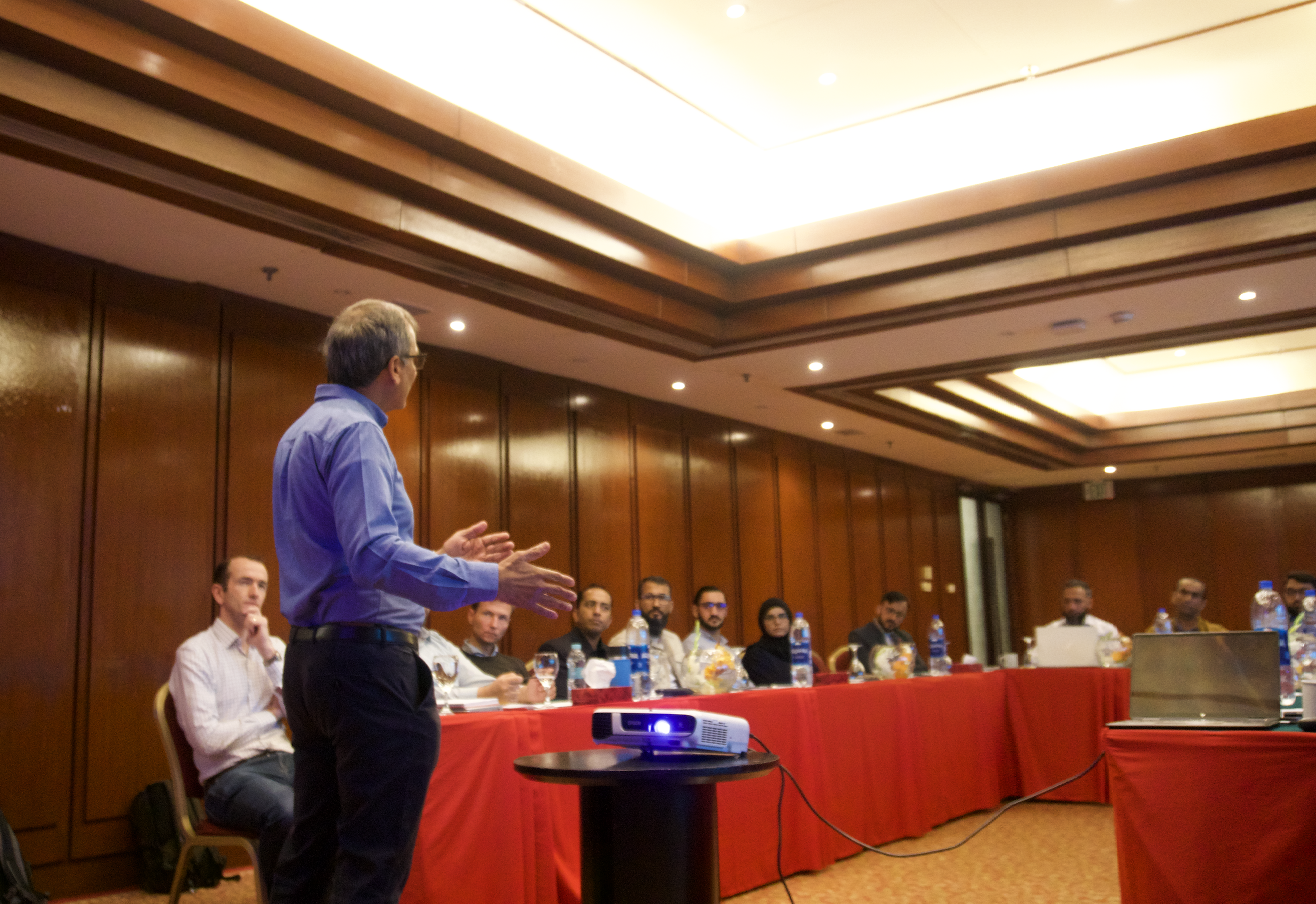
Following classroom sessions, engineers are currently undergoing a nine-week on-site building inspection and reporting training.
Factory Inspections
As part of the on-site training, trainee engineers joined the fire, electrical, and structural safety inspections at least 10 factories covered under the Pakistan Accord. Based on the complexity of the factories, these visits typically lasted one day.
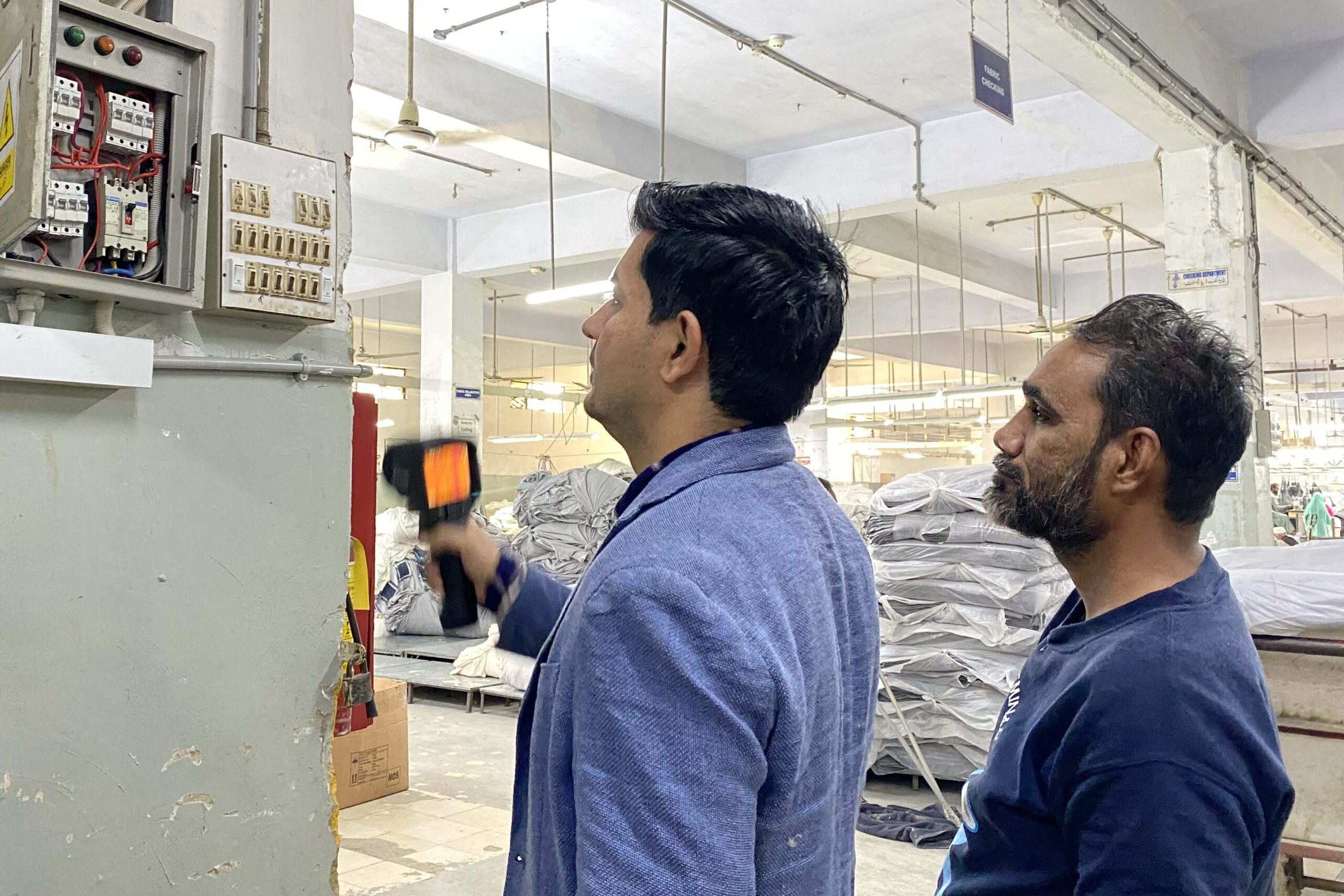
The inspection day started with an opening meeting with factory management, followed by a walk around the building exterior and through all interior rooms and spaces. The team also conducted non-destructive testing as required, for example, measuring concrete hardness and thermographic scanning to identify electrical hotspots.
These initial inspections are part of the Pakistan Accord’s inspections and remediation program that began in November 2023. This recent round of inspections brings the number of factories covered under the Pakistan Accord to receive initial inspections to over 25 factories.
Resources:
Related updates
May 28, 2025
The International Accord’s All Signatory Meeting was dedicated to insights on the progress and operations of the Accord’s country program in Bangladesh and Pakistan, alongside exploring opportunities to expand the Accord’s scope and impact.
March 10, 2025
This briefing provides updates on the number of signatory brands and covered factories, the rollout of Workplace Programs, and recent events organised by the Pakistan Accord team.
February 19, 2025
The Pakistan Accord team recently organised a series of capacity building workshops for government officials in the Sindh and Punjab provinces.
May 28, 2025
The International Accord’s All Signatory Meeting was dedicated to insights on the progress and operations of the Accord’s country program in Bangladesh and Pakistan, alongside exploring opportunities to expand the Accord’s scope and impact.
February 19, 2025
The Pakistan Accord team recently organised a series of capacity building workshops for government officials in the Sindh and Punjab provinces.
November 28, 2024
On 26 and 27 November 2024 the Pakistan Accord conducted its inaugural safety training meeting in Pakistan. The meeting was attended by all employees of the factory.
Brand-Supplier meetings in Pakistan highlight collaboration opportunities on workplace health and safety
Updates
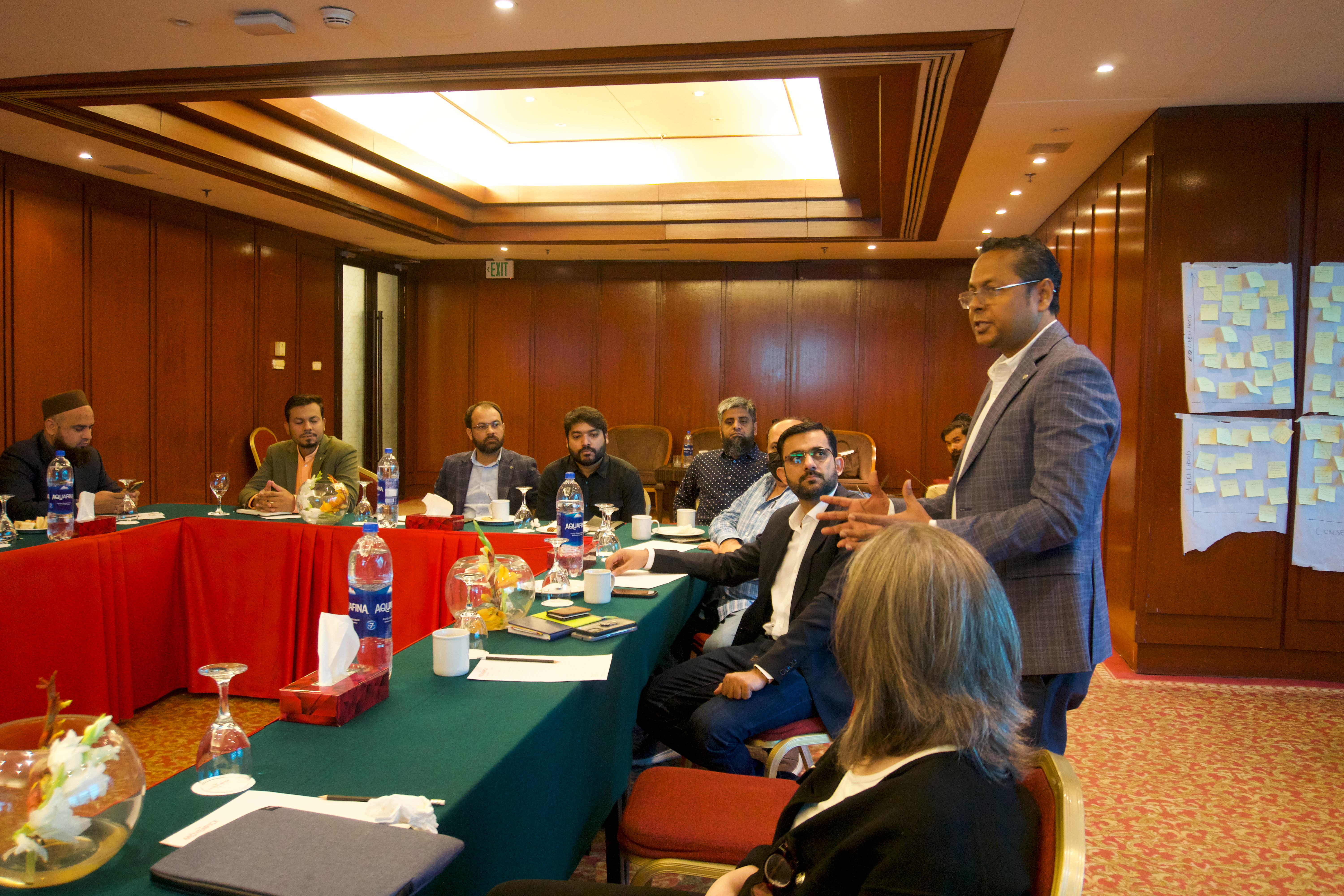
The International Accord Secretariat alongside the Pakistan Accord team organised a series of five brand-supplier meetings in Lahore and Karachi between 5 – 7 March 2024.
The purpose of these meetings was to to provide information about the Accord and its key programs for suppliers, and enhance engagement between brands that have signed the Pakistan Accord and their Pakistani suppliers. A supplier/factory becomes part of the Accord program in Pakistan once a brand sourcing from them signs the Pakistan Accord and lists it as a supplier.
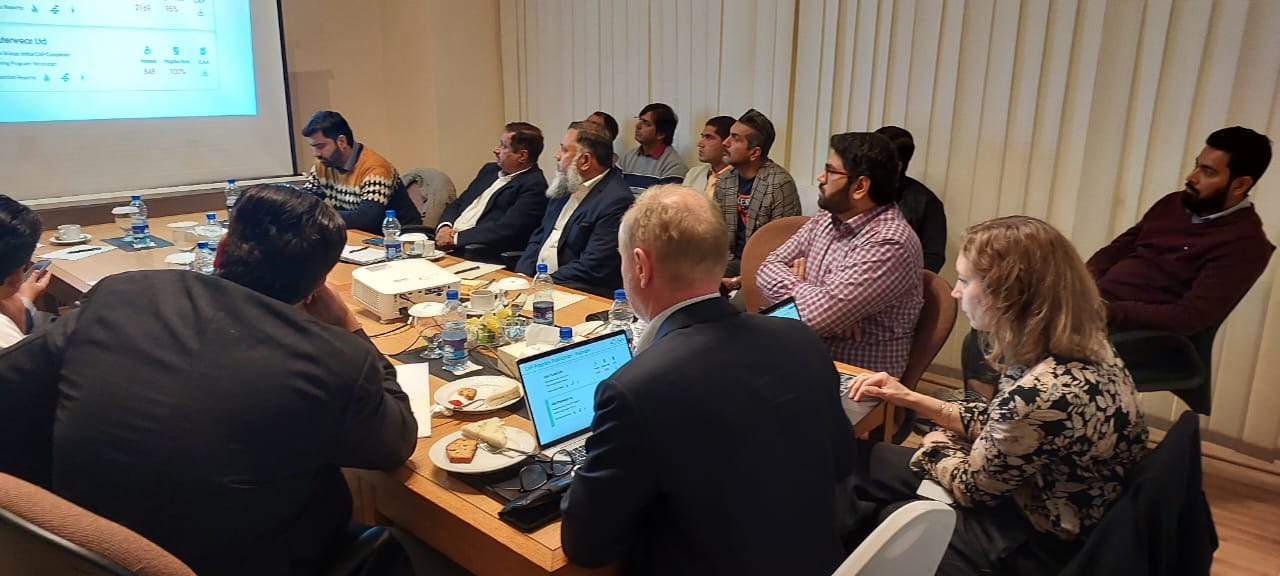
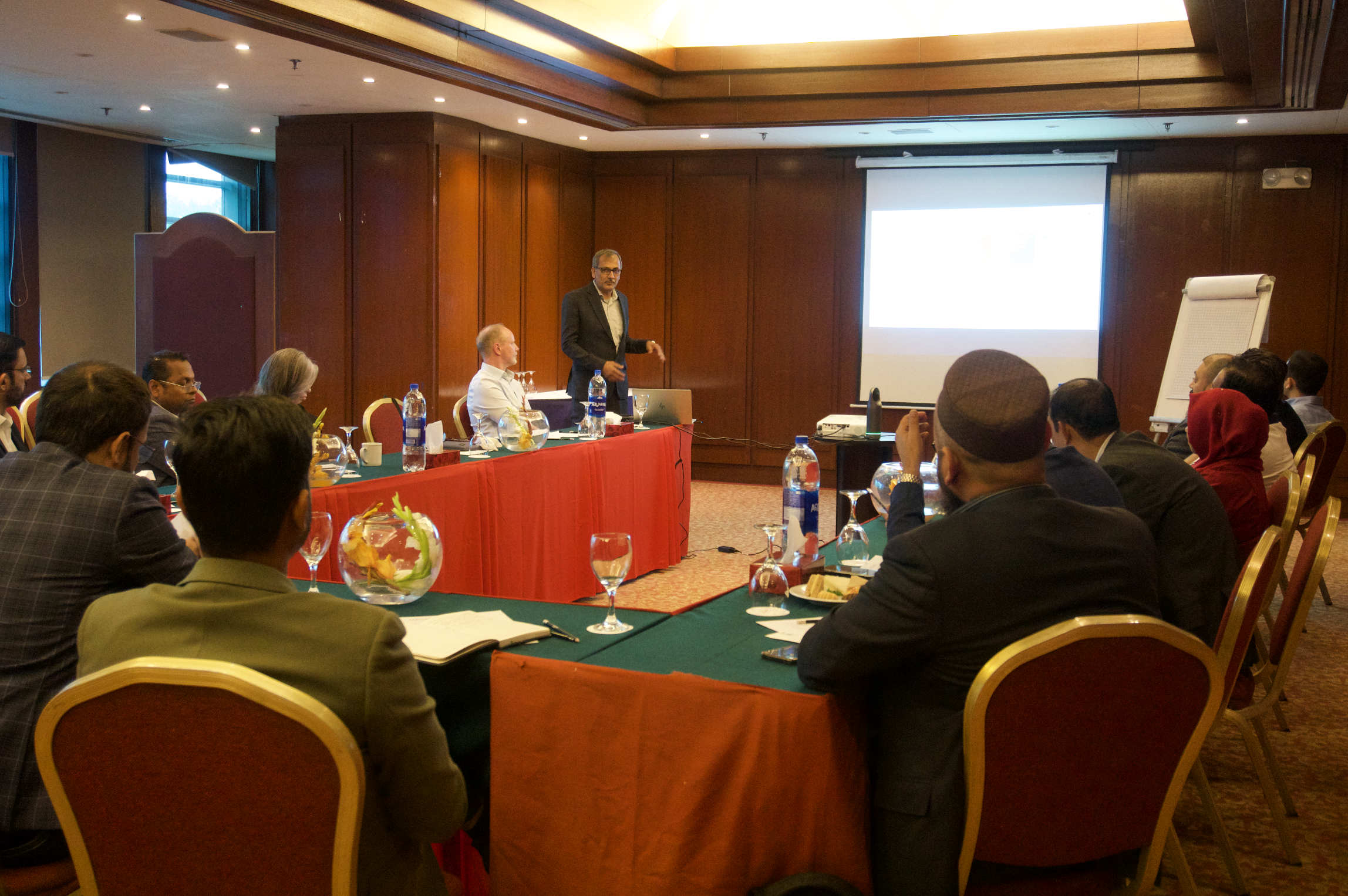
The Accord team comprising presentations by Clara Kamphorst (Stakeholder Engagement Manager), Koen Oosterom (Head of Signatory Engagement), Veronique Camerer (Deputy Director, International Accord), Kirstine Drew (Chief Complaints Officer, Pakistan Accord), and Zulfiqar Shah (Country Manager, Pakistan Accord) shared insights on:
- The health and safety topics covered under the Pakistan Accord.
- The impact of the program for suppliers and the support available for them.
- The features, programs, and reasons to participate in the Pakistan Accord.
The sessions were attended by over 100 Pakistani suppliers and Pakistan Accord signatory brands including Adidas, Primark, GAP Inc. and the Boohoo Group.
Speaking about their participation at the event, Sam Leach from the Boohoo Group said:
The Boohoo Group sees the Accord framework as a great opportunity for our factories, not only to improve their building, electrical, fire, and boiler safety standards but also to enhance worker safety standards as a whole. We have seen the great work done in Bangladesh over the last 10+ years and we look forward to continuing to collaborate with The Accord and other international retailers to improve factory standards. As a part of these collaborative efforts, the Boohoo Group and The International Accord organised two brand-supplier meetings in Pakistan for Boohoo Group suppliers and factories in Karachi and Lahore. These meetings were well received by the suppliers with follow-up expressions of gratitude. We are encouraged to see that all our suppliers recognise the importance of the Pakistan Accord and are fully on board with the program.
We thank all attendees for their participation in these meetings and look forward to our continued engagement.
Resources:
Related updates
May 28, 2025
The International Accord’s All Signatory Meeting was dedicated to insights on the progress and operations of the Accord’s country program in Bangladesh and Pakistan, alongside exploring opportunities to expand the Accord’s scope and impact.
March 10, 2025
This briefing provides updates on the number of signatory brands and covered factories, the rollout of Workplace Programs, and recent events organised by the Pakistan Accord team.
February 19, 2025
The Pakistan Accord team recently organised a series of capacity building workshops for government officials in the Sindh and Punjab provinces.
May 28, 2025
The International Accord’s All Signatory Meeting was dedicated to insights on the progress and operations of the Accord’s country program in Bangladesh and Pakistan, alongside exploring opportunities to expand the Accord’s scope and impact.
February 19, 2025
The Pakistan Accord team recently organised a series of capacity building workshops for government officials in the Sindh and Punjab provinces.
November 28, 2024
On 26 and 27 November 2024 the Pakistan Accord conducted its inaugural safety training meeting in Pakistan. The meeting was attended by all employees of the factory.

